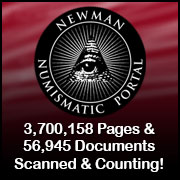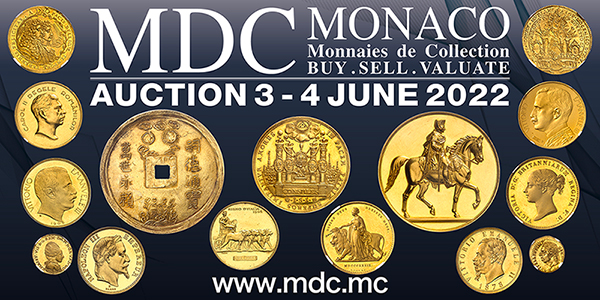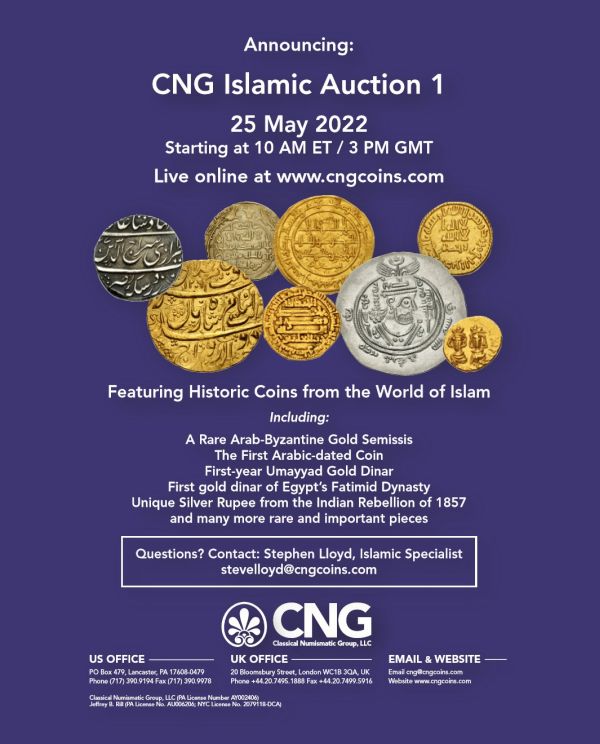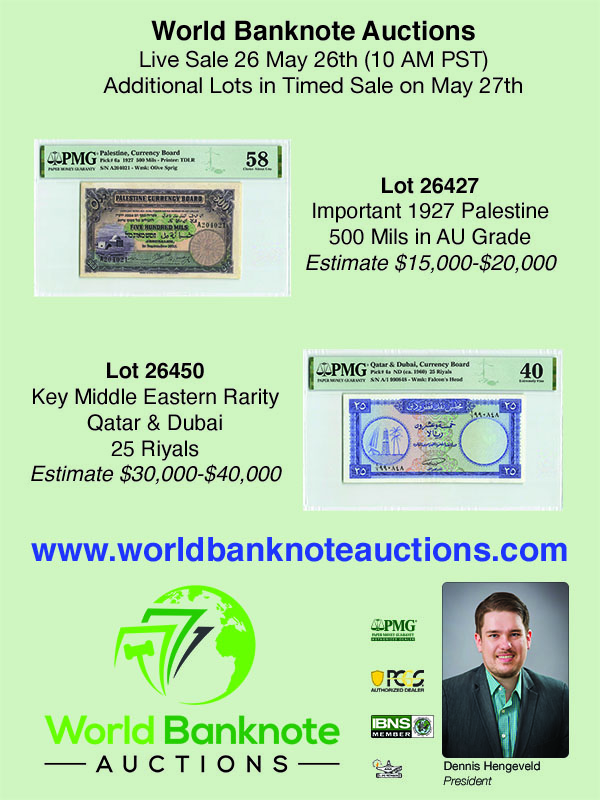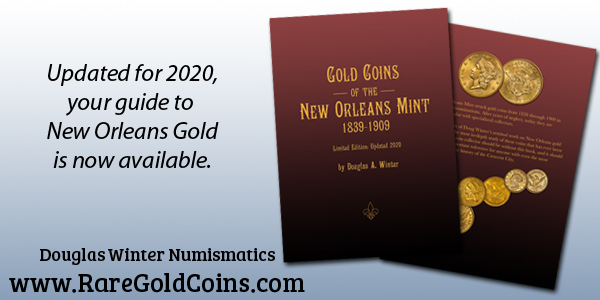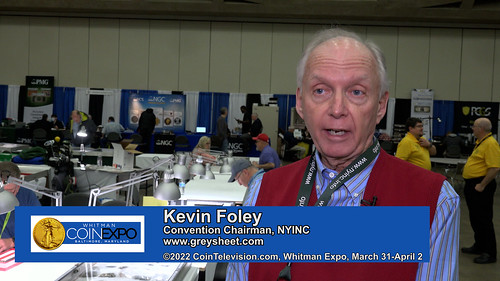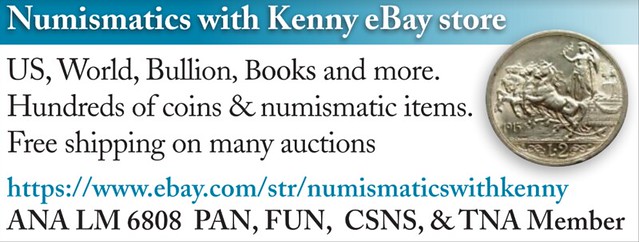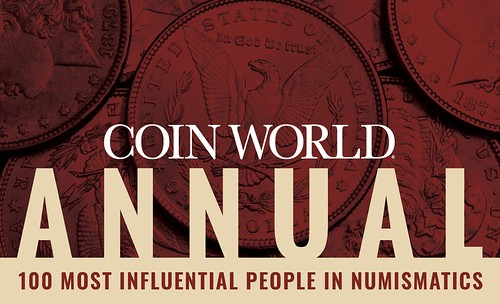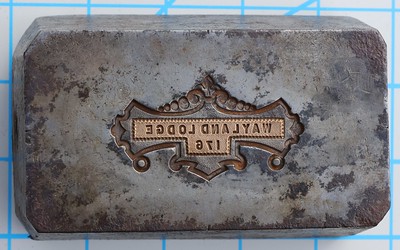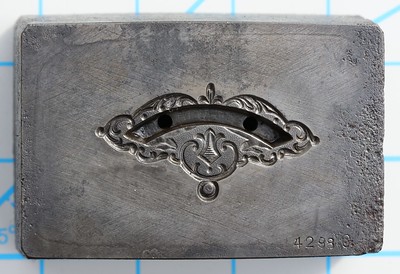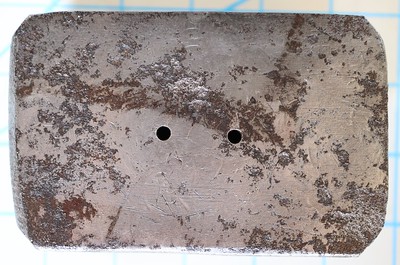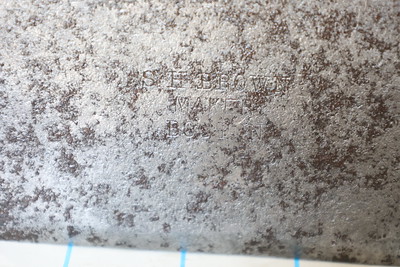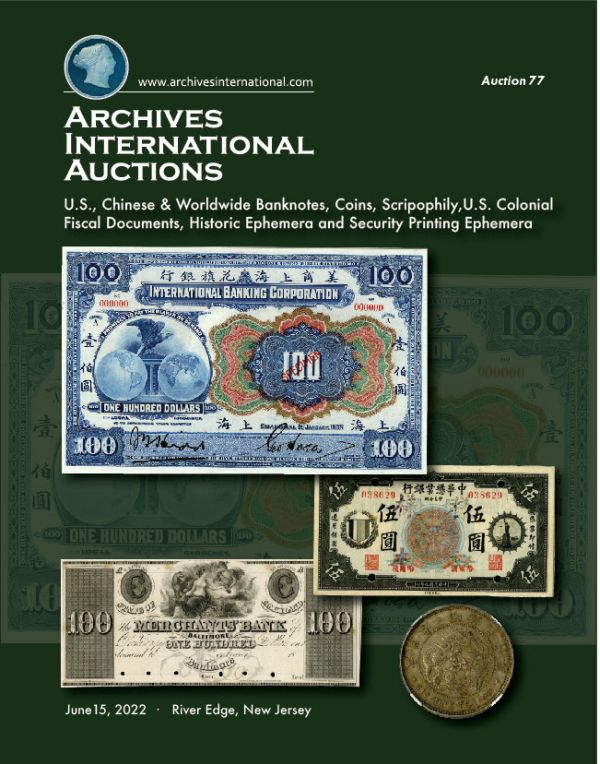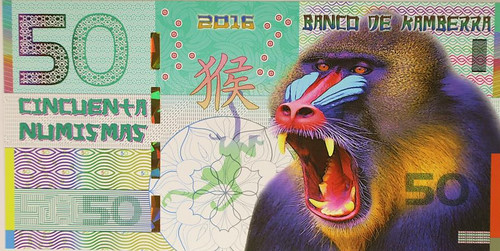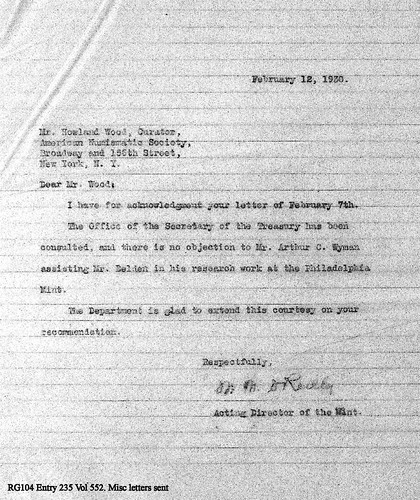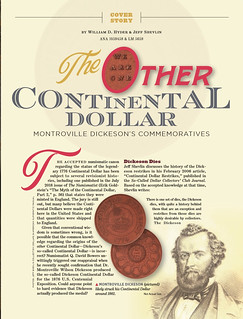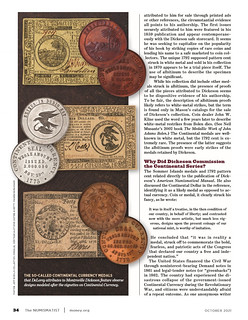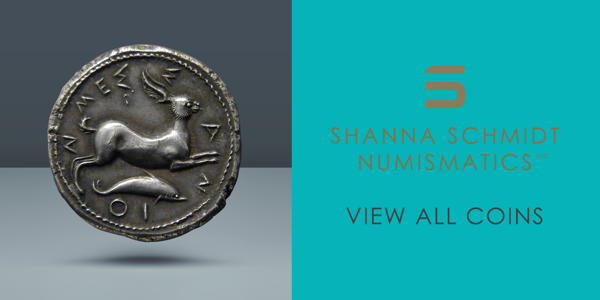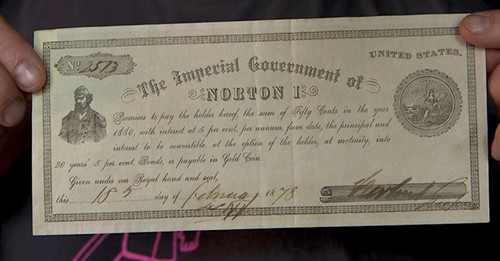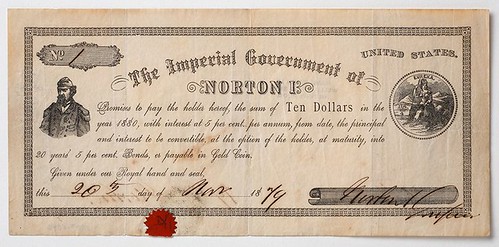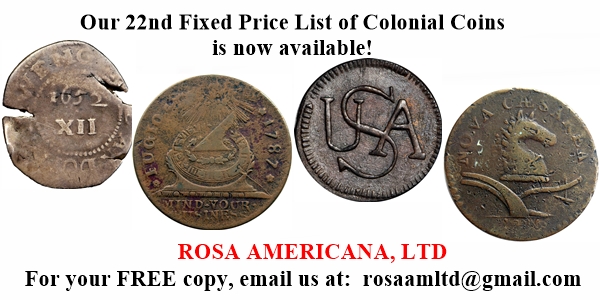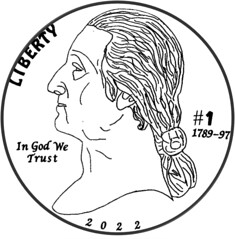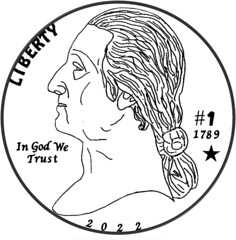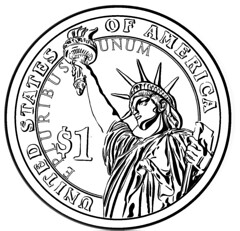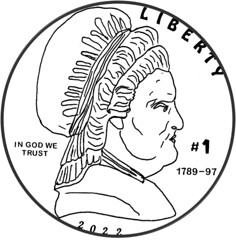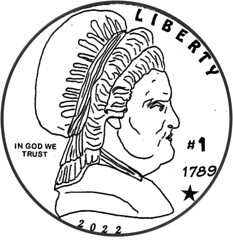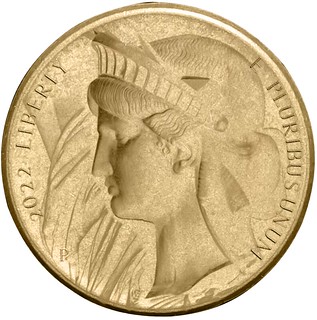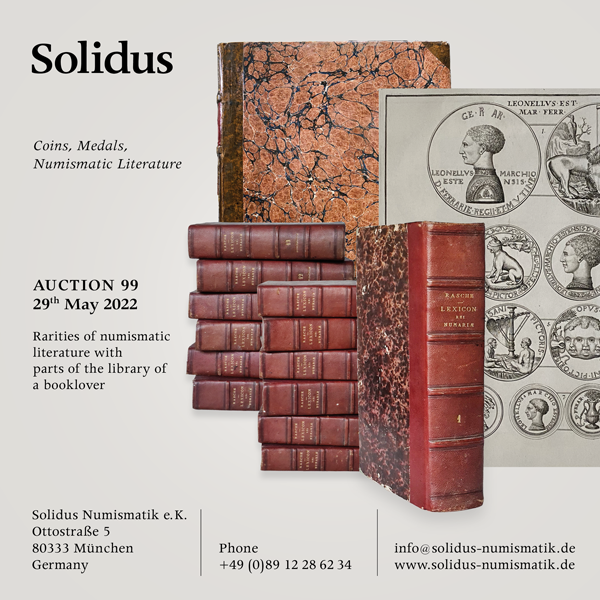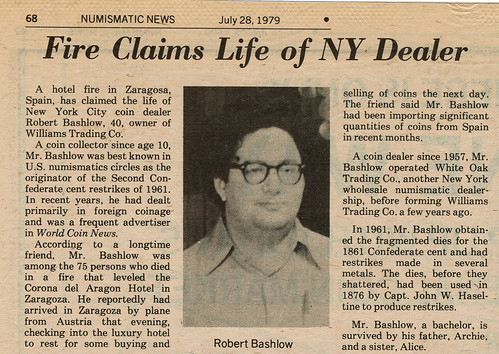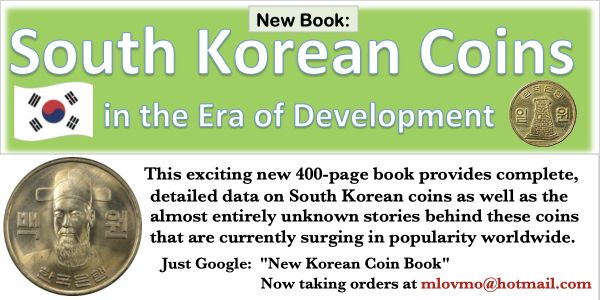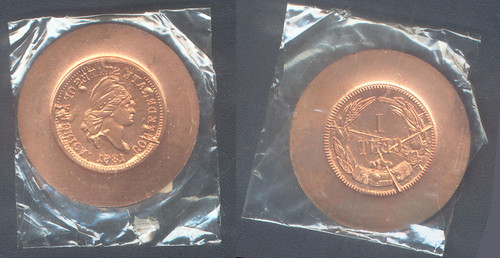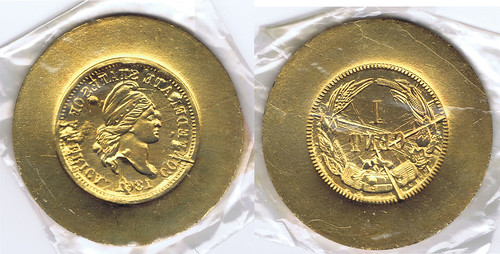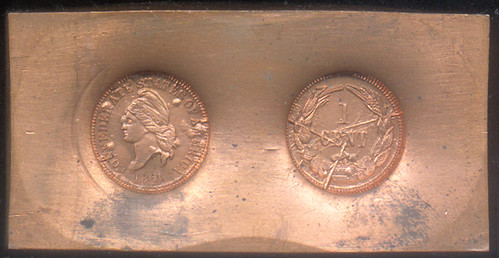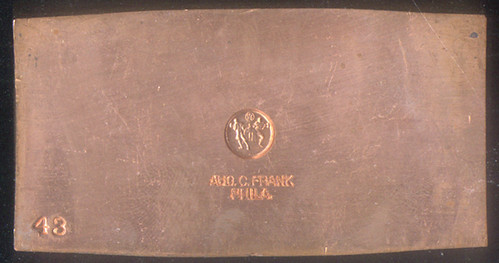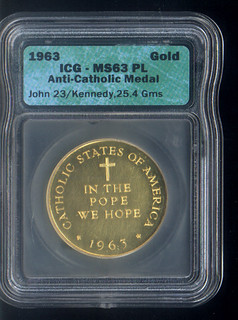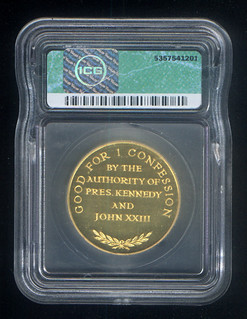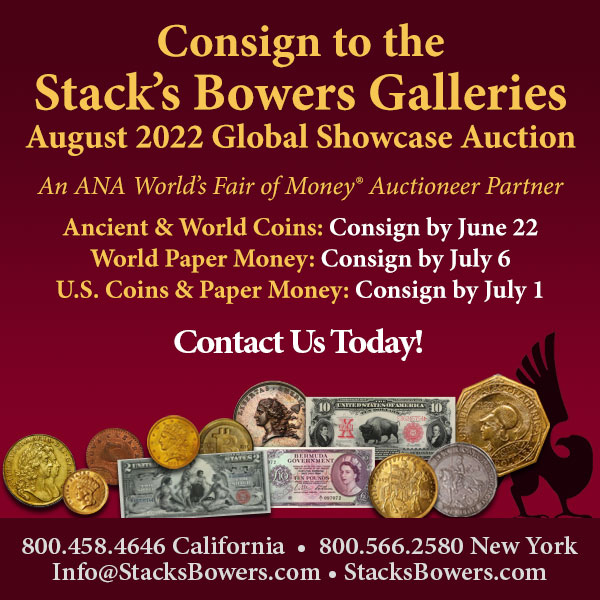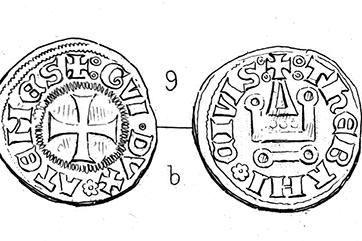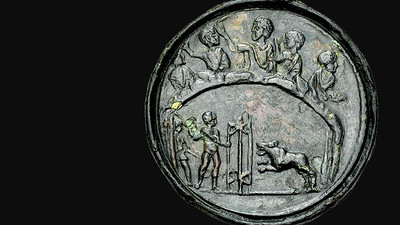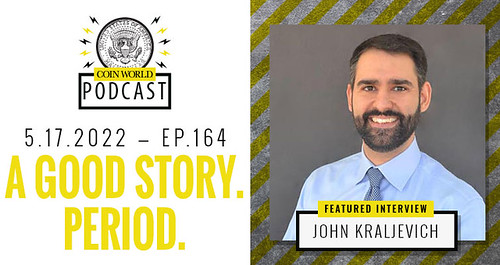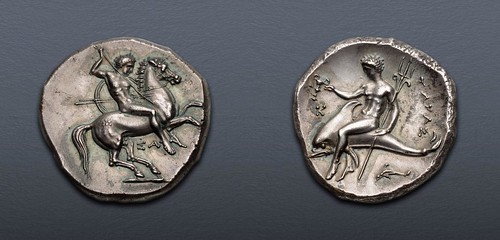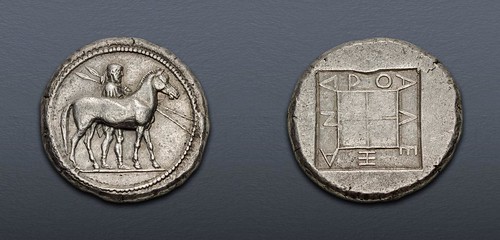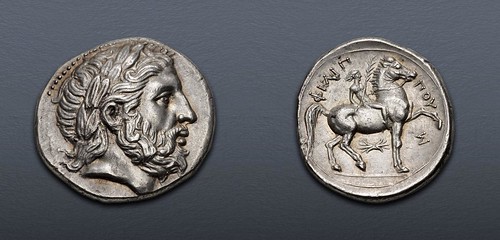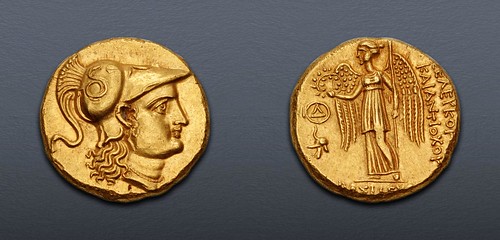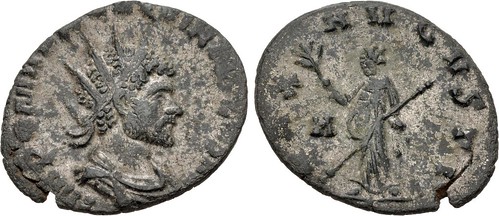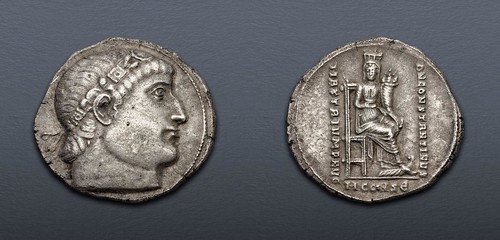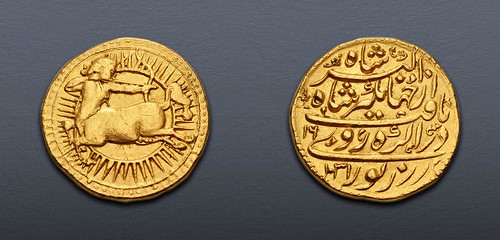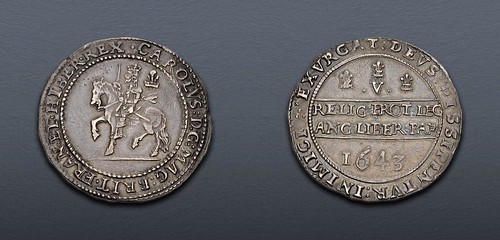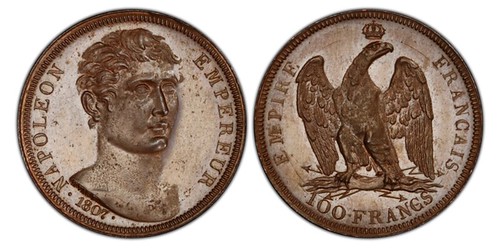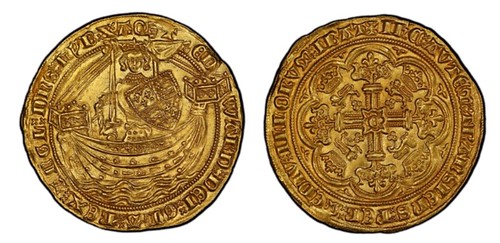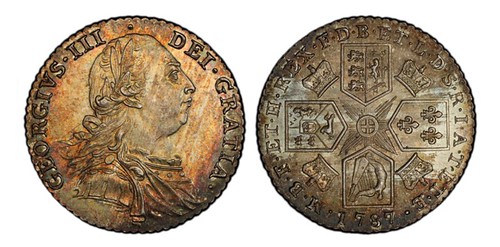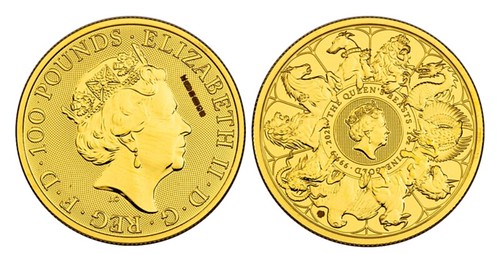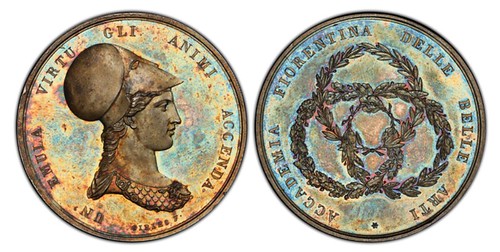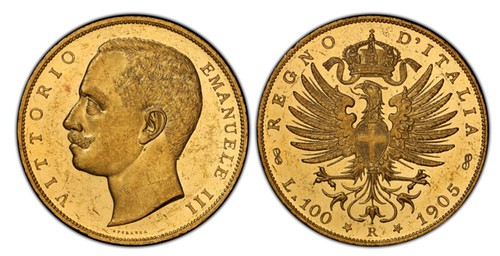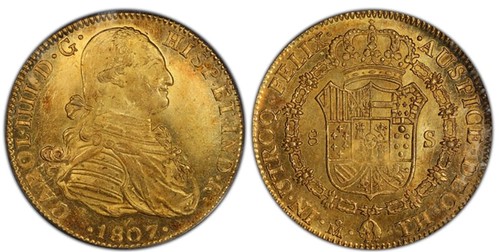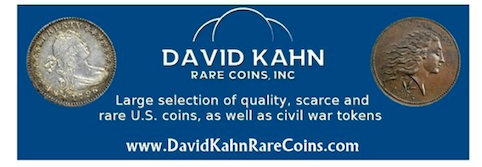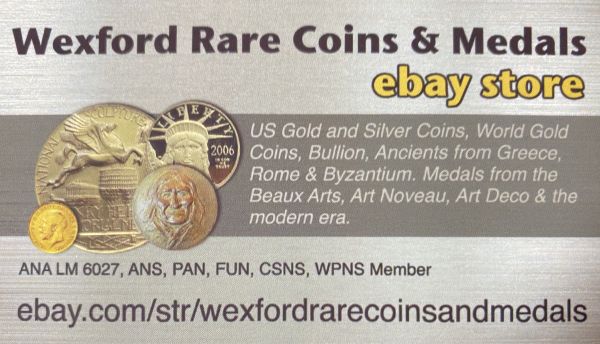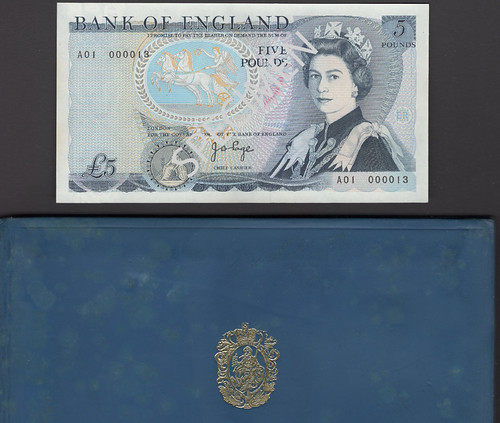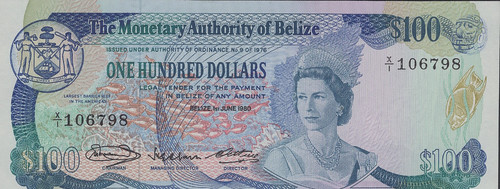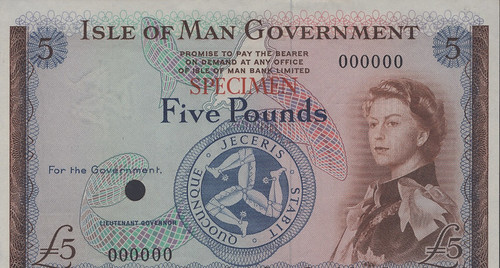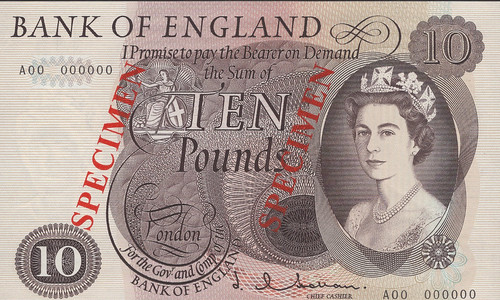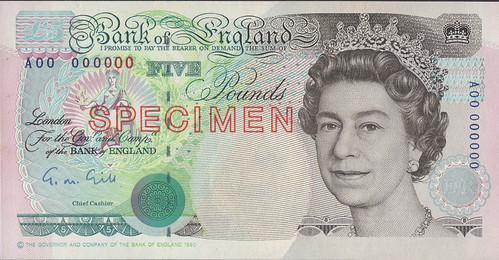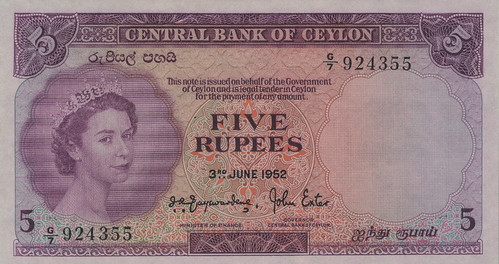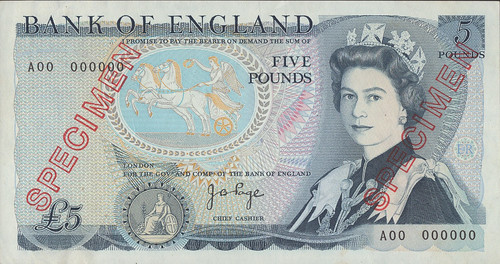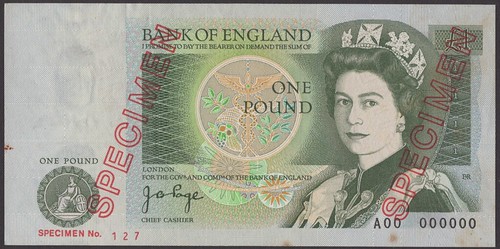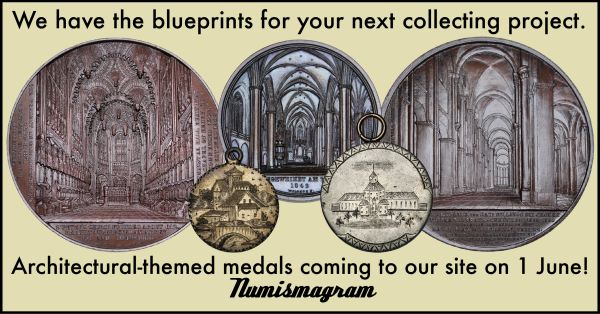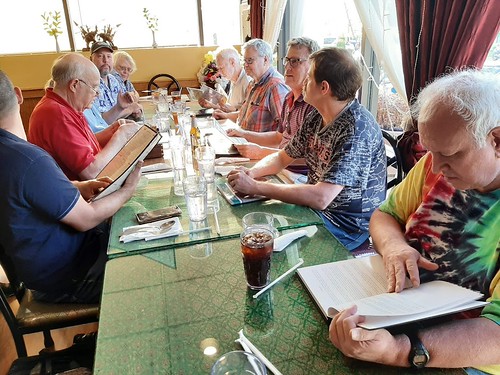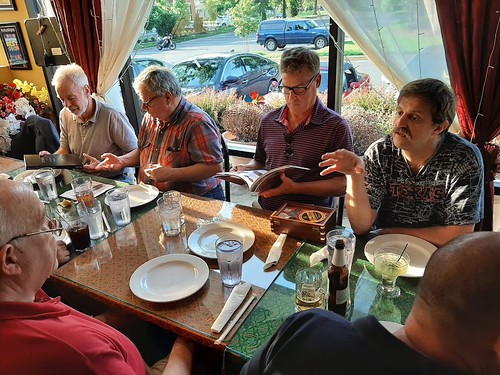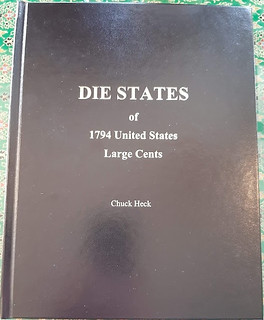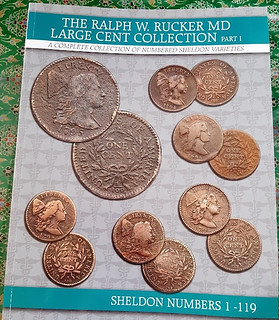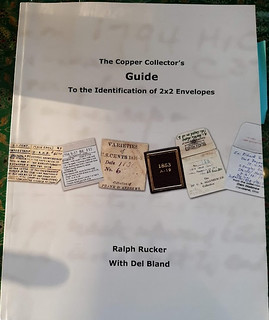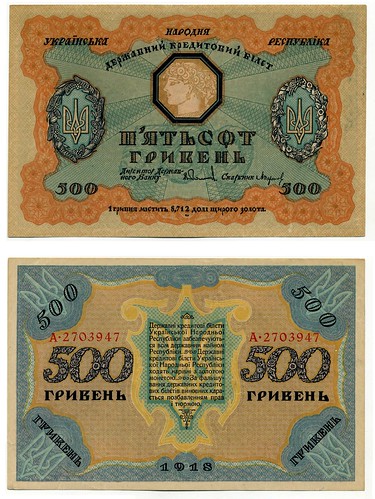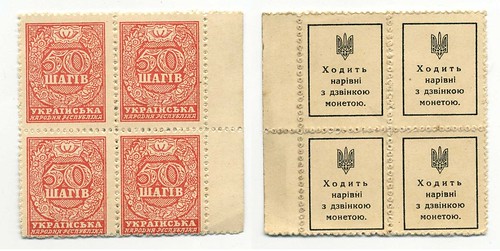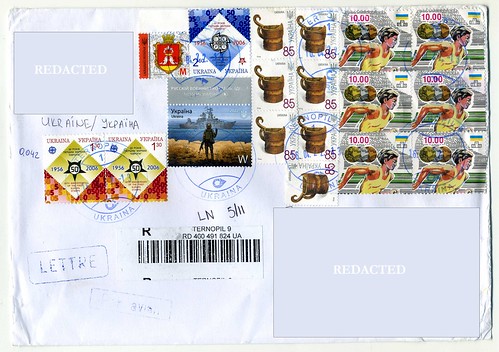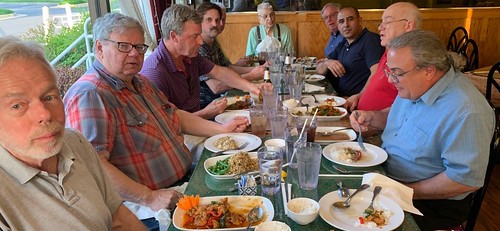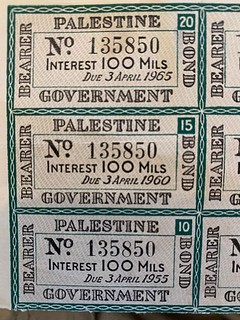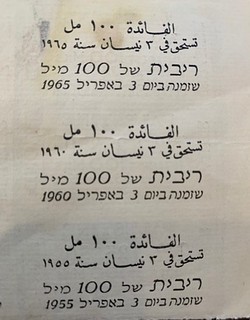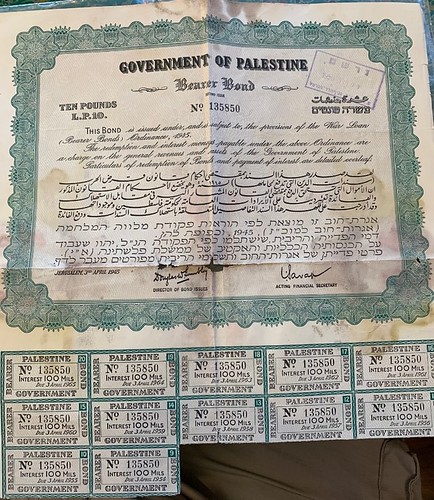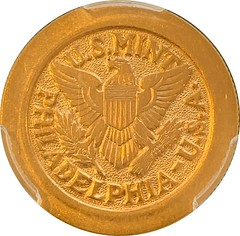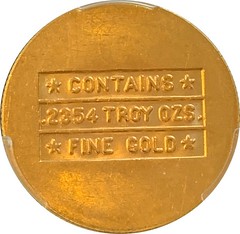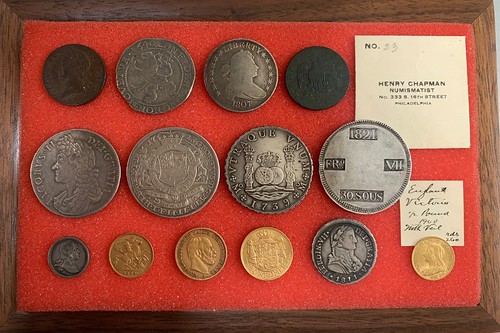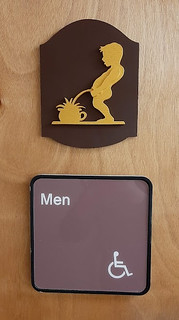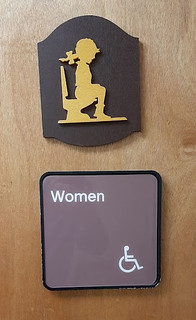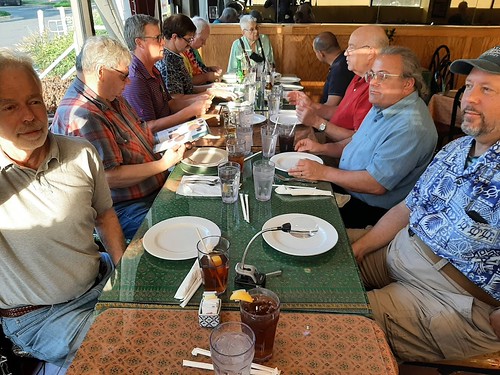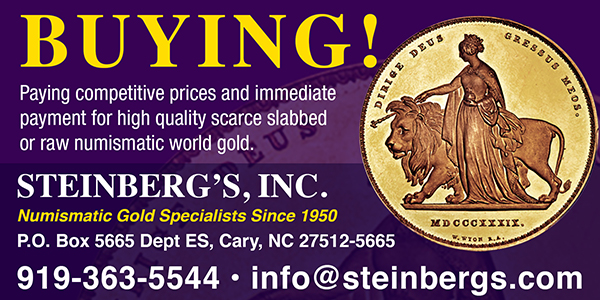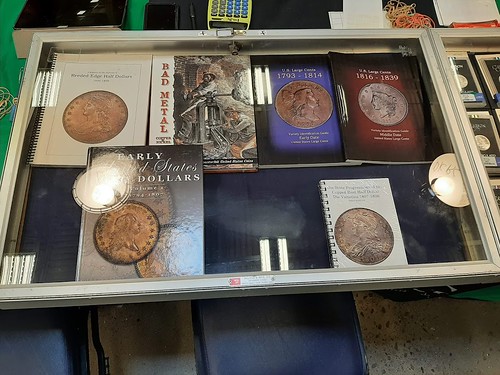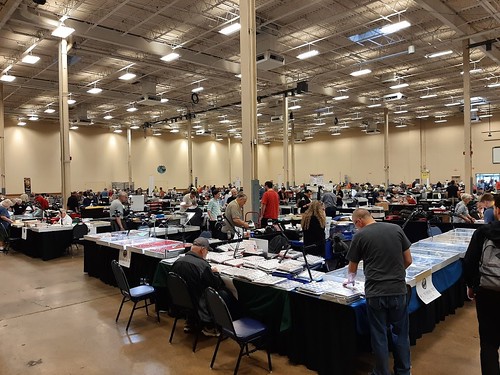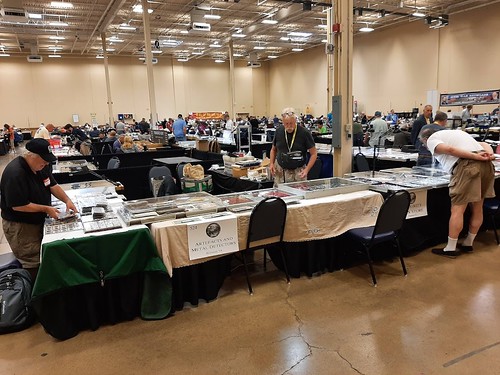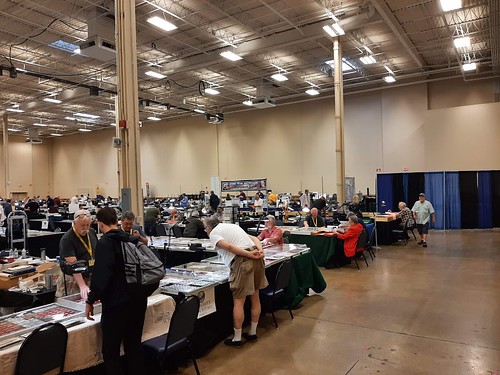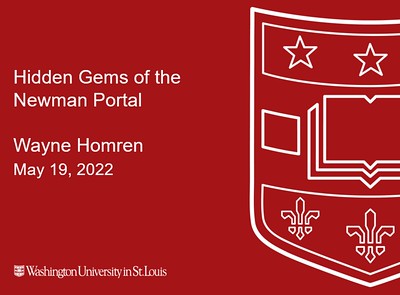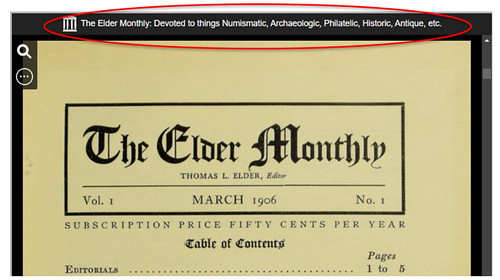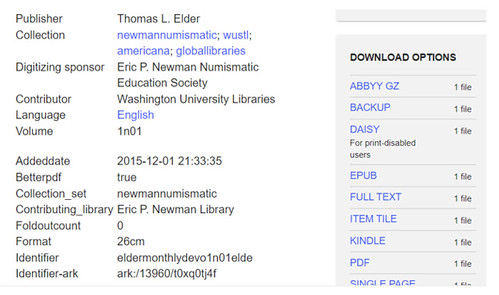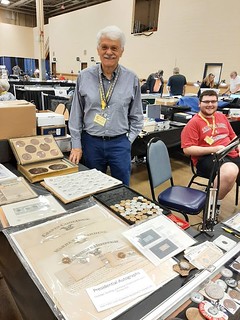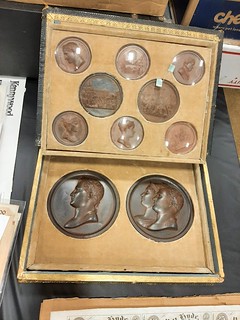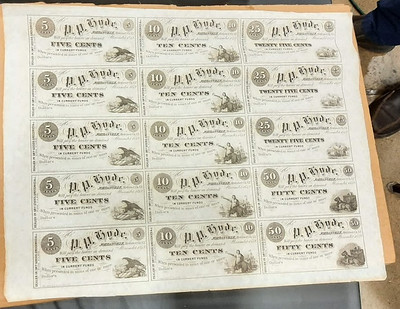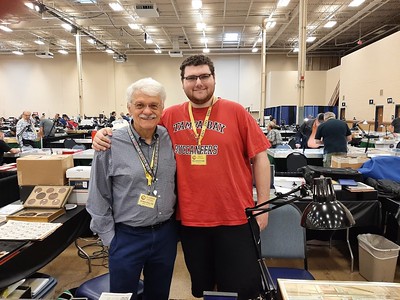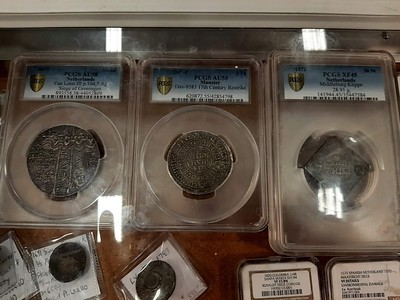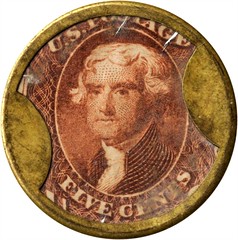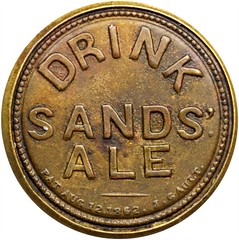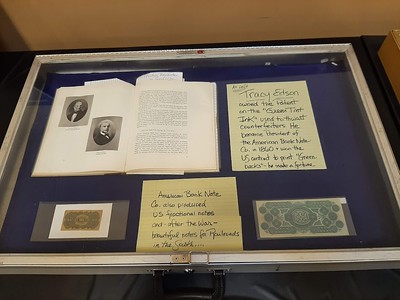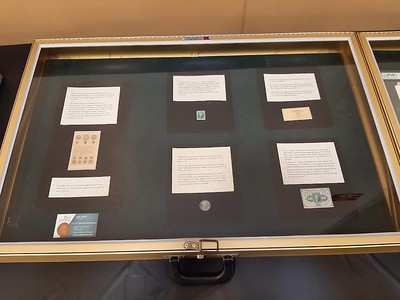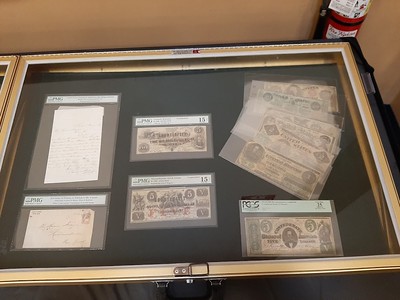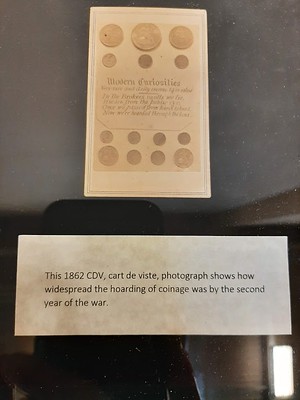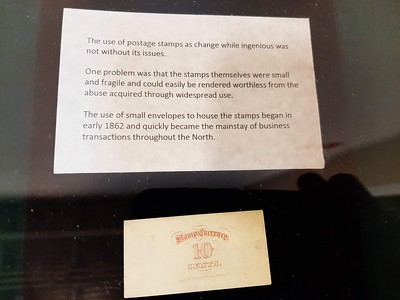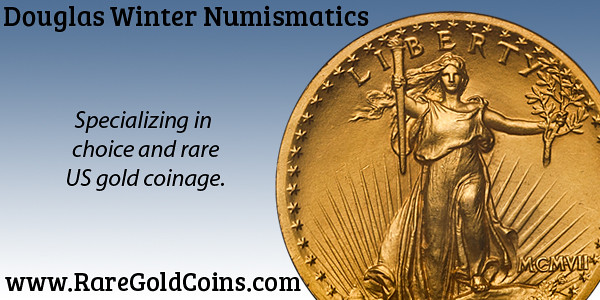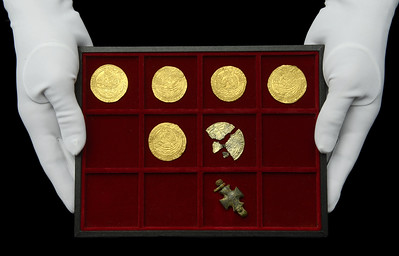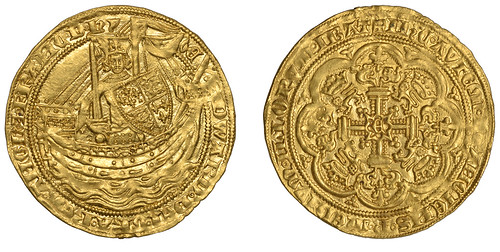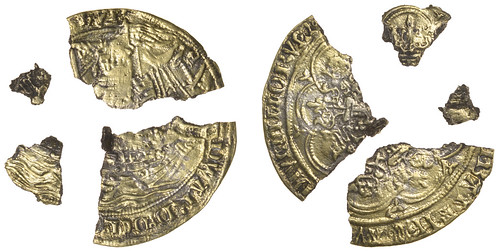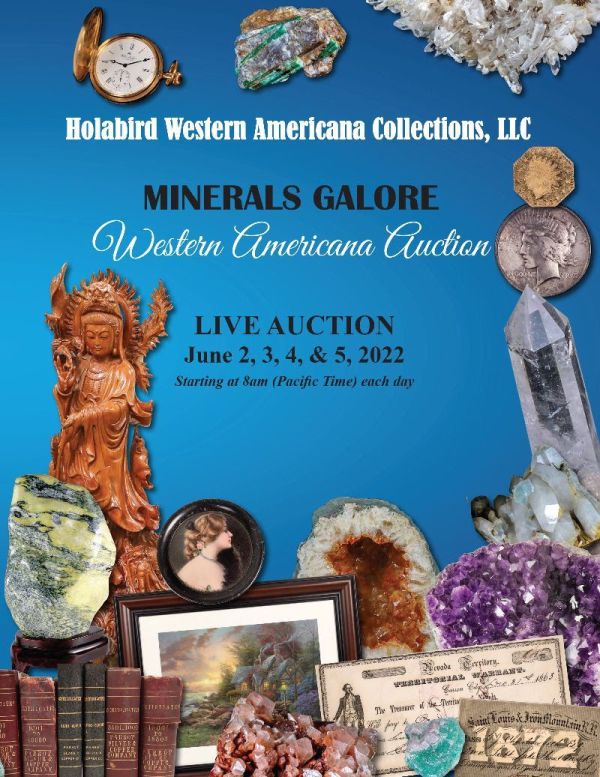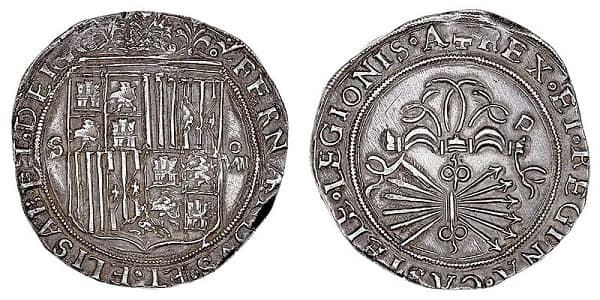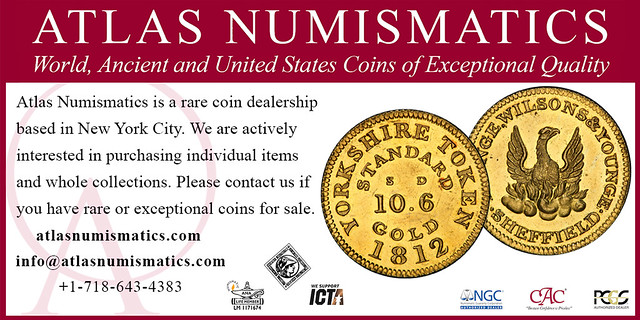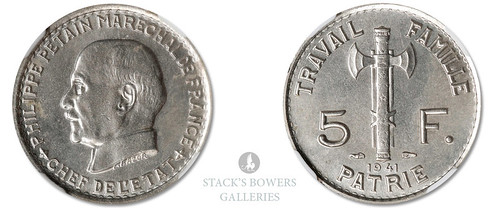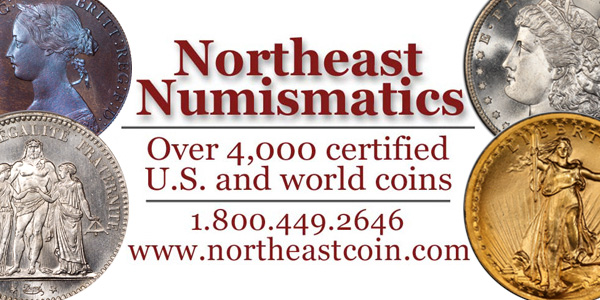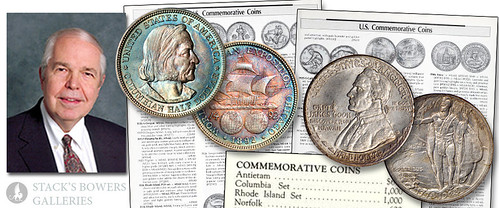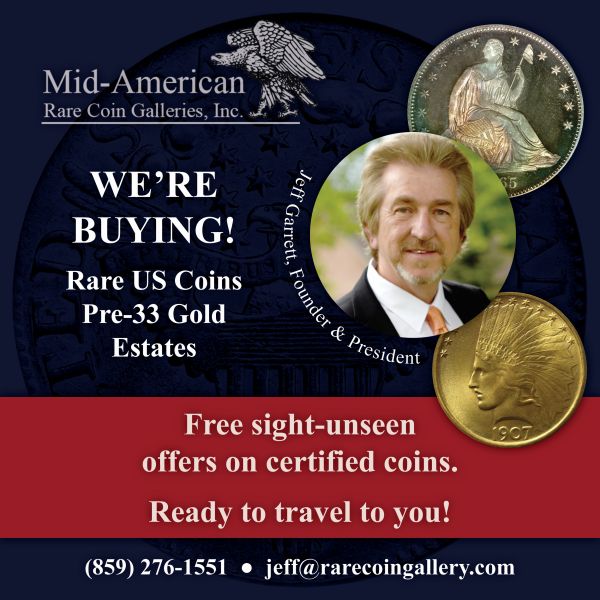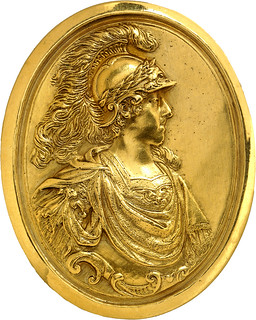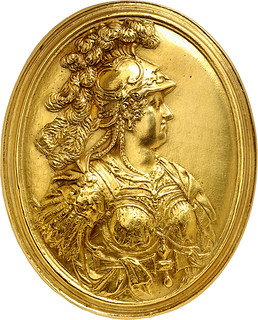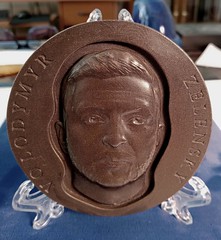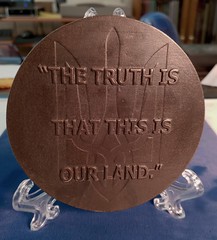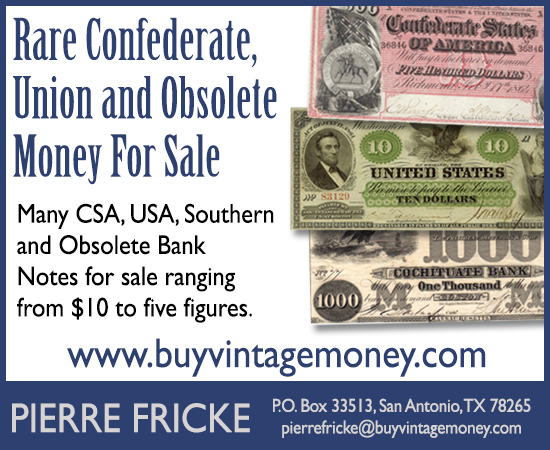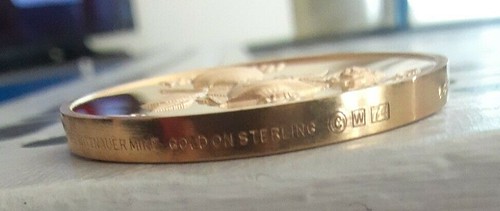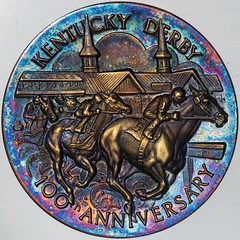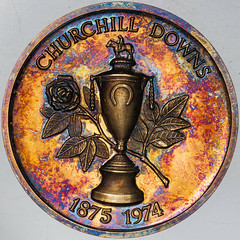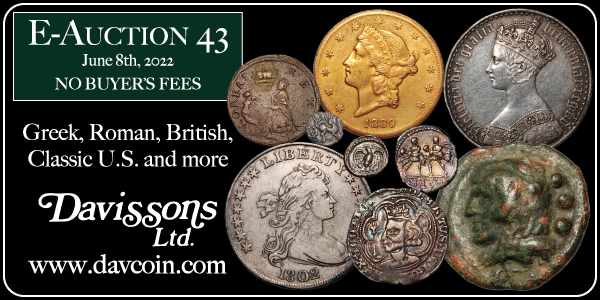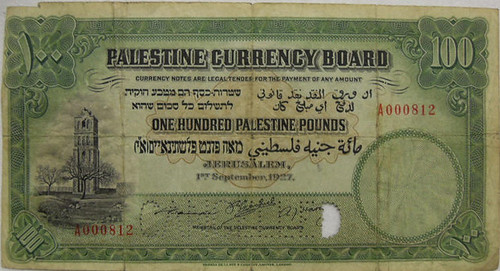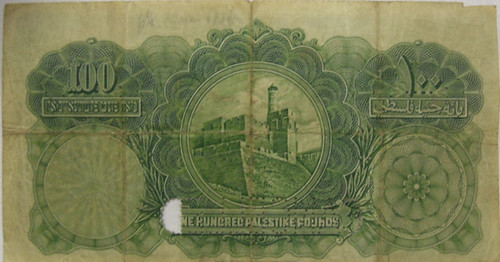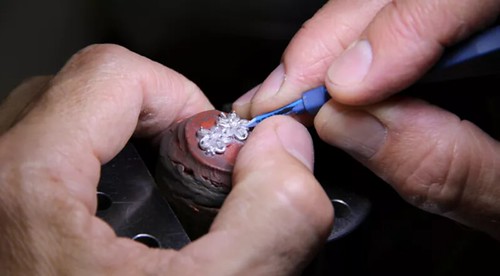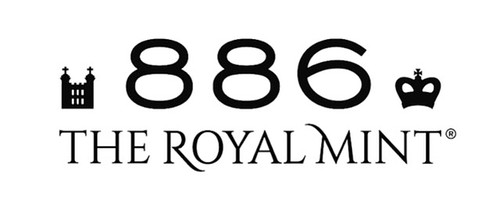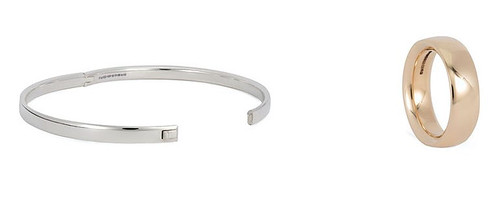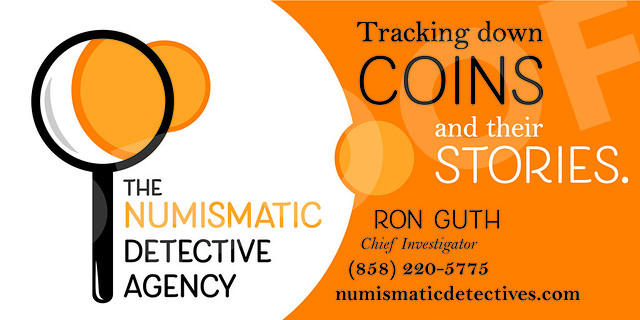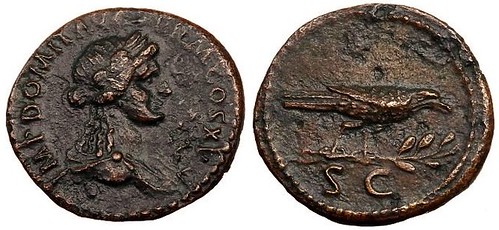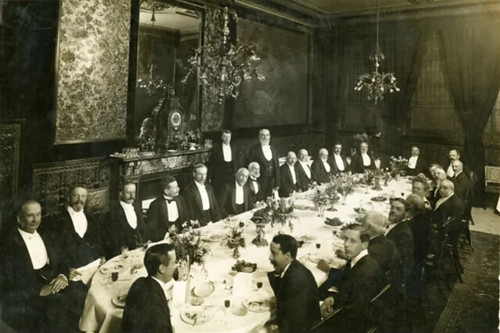
Visit our NBS Sponsors



About UsThe Numismatic Bibliomania Society is a non-profit association devoted to the study and enjoyment of numismatic literature. For more information please see our web site at coinbooks.org SubscriptionsThose wishing to become new E-Sylum subscribers (or wishing to Unsubscribe) can go to the following web page link MembershipThere is a membership application available on the web site Membership Application To join, print the application and return it with your check to the address printed on the application. Print/Digital membership is $40 to addresses in the U.S., and $60 elsewhere. A digital-only membership is available for $25. For those without web access, write to: Charles Heck, Treasurer AsylumFor Asylum mailing address changes and other membership questions, contact Chuck at this email address: treasurer@coinbooks.org SubmissionsTo submit items for publication in The E-Sylum, write to the Editor at this address: whomren@gmail.com BUY THE BOOK BEFORE THE COINSale CalendarWatch here for updates! |
- WAYNE'S WORDS: THE E-SYLUM MAY 22, 2022
- KOLBE & FANNING SYD MARTIN LIBRARY CATALOGS
- NEW BOOK: SCRIPTA MIRABILIA
- NNP ADDS DECORAH NUMISMATIC JOURNAL
- VIDEO: 2023 NEW YORK INTERNATIONAL
- COIN WORLD'S 2022 MOST INFLUENTIAL PEOPLE SURVEY
- MORE ON INSERT DIES
- NOTES FROM E-SYLUM READERS: MAY 22, 2022
- SAN FRANCISCO'S EMPEROR NORTON
- EXTENDING THE PRESIDENTIAL DOLLAR SERIES
- VOCABULARY TERM: INSTITUTE OF HERALDRY
- ROBERT BASHLOW, PART FOUR
- MORE BASHLOW PRODUCTIONS
- UPCOMING NUMISMATIC EVENTS: MAY 22, 2022
- CNG FEATURE AUCTION 120 RESULTS
- ATLAS NUMISMATICS MAY 2022 SELECTIONS
- NOONAN'S PLATINUM JUBILEE BANKNOTE AUCTION
- PLATINUM JUBILEE BANKNOTE AUCTION SELECTIONS
- WAYNE'S NUMISMATIC DIARY: MAY 22, 2022
- WAYNE'S NUMISMATIC DIARY: PAN SHOW MAY 2022
- 14TH CENTURY PURSE WITH FIVE GOLD COINS FOUND
- EIGHT REALES: THE FIRST INTERNATIONAL CURRENCY
- THE 1941 VICHY FRENCH 5 FRANCS
- COMMEMORATIVE MARKET RISE AND FALL, PART 2
- LOUIS XIII GOLD MEDALLION
- MORE ON THE ZELENSKY MEDAL
- KENTUCKY DERBY CENTENNIAL MEDAL
- DID SAN FRANCISCO BUY NORTON A NEW SUIT?
- THRIFT SHOP PALESTINE BANKNOTE FIND
- THE ROYAL CANADIAN MINT'S "ULTIMATE" COIN
- ROYAL MINT LAUNCHES LUXURY JEWELLERY LINE
- LOOSE CHANGE: MAY 22, 2022
- FEATURED WEB SITE: ROYAL NUMISMATIC SOCIETY
Click here to read the thin version on the web
Click here to subscribe
Click here to access the complete archive
To comment or submit articles, reply to whomren@gmail.com
Content presented in The E-Sylum is not necessarily researched or independently fact-checked, and views expressed do not necessarily represent those of the Numismatic Bibliomania Society.
WAYNE'S WORDS: THE E-SYLUM MAY 22, 2022
 New subscribers this week include:
Judy Blackman.
Welcome aboard!
New subscribers this week include:
Judy Blackman.
Welcome aboard!
Thank you for reading The E-Sylum. If you enjoy it, please send me the email addresses of friends you think may enjoy it as well and I'll send them a subscription. Contact me at whomren@gmail.com anytime regarding your subscription, or questions, comments or suggestions about our content.
This week we open with Syd Martin library sale catalogs, one new book, updates from the Newman Numismatic Portal, Coin World's Most Influential People survey, and more.
Other topics this week include insert dies, Emperor Norton, Presidential dollar design ideas, Heraldry, auction previews, Wayne's Numismatic Diaries, coin and banknote finds, the Kentucky Derby centennial medal, and the Royal Canadian Mint's "Ultimate" coin.
To learn more about the earliest coin found in Catalonia, the Decorah Numismatic Journal, the 2023 New York International, the death of Robert Bashlow, coins and the Colosseum, the Zodiac gold Mohur, the Florentine Academy of Fine Arts medal, die states of 1794 United States Large Cents, ARAMCO gold discs, Matt Tavory, the Zelensky medal and the Forger Wanted ad, read on. Have a great week, everyone!
Wayne Homren
Editor, The E-Sylum
KOLBE & FANNING SYD MARTIN LIBRARY CATALOGS
Hardcover and leatherbound editions of the Sydney F. Martin library sale are being offered by Kolbe & Fanning. -Editor
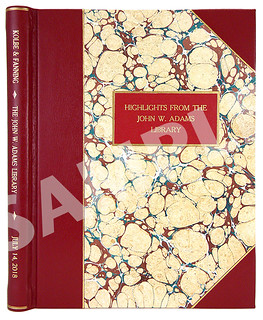 DELUXE LEATHERBOUND LIMITED EDITION OF THE NUMISMATIC LIBRARY OF SYDNEY F. MARTIN.; PRE-ORDER
DELUXE LEATHERBOUND LIMITED EDITION OF THE NUMISMATIC LIBRARY OF SYDNEY F. MARTIN.; PRE-ORDER
Gahanna: Kolbe & Fanning, April 30, 2022. 4to, half calf and marbled paper; cover label; gilt [Will be similar to image shown]; original pictorial covers bound in. 154 pages; 472 lots; profusely illustrated in color. PRL bound in. New. Item #6786
Price: $500.00
For more information, or to order, see:
DELUXE LEATHERBOUND LIMITED EDITION OF THE NUMISMATIC LIBRARY OF SYDNEY F. MARTIN.; PRE-ORDER
(https://www.numislit.com/pages/books/6786/kolbe-fanning/deluxe-leatherbound-limited-edition-of-the-numismatic-library-of-sydney-f-martin-pre-order)
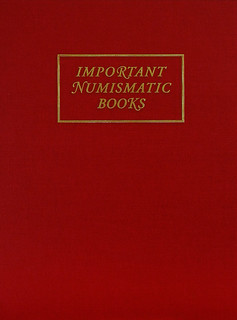 REGULAR HARDCOVER EDITION OF THE NUMISMATIC LIBRARY OF SYDNEY F. MARTIN.; PRE-ORDER
REGULAR HARDCOVER EDITION OF THE NUMISMATIC LIBRARY OF SYDNEY F. MARTIN.; PRE-ORDER
Gahanna: Kolbe & Fanning, April 30, 2022. 4to, maroon cloth; gilt [Will be similar to image shown]; original pictorial covers bound in. 154 pages; 472 lots; profusely illustrated in color. PRL bound in. New. Item #6818
Price: $60.00
For more information, or to order, see:
REGULAR HARDCOVER EDITION OF THE NUMISMATIC LIBRARY OF SYDNEY F. MARTIN.; PRE-ORDER
(https://www.numislit.com/pages/books/6818/kolbe-fanning/regular-hardcover-edition-of-the-numismatic-library-of-sydney-f-martin-pre-order)
NEW BOOK: SCRIPTA MIRABILIA
Robert Hoge passed along the announcement for a new festschrift being published. Most of the articles are in Catalan or Spanish, with three pertaining to numismatics: two by prominent Catalan numismatists Miquel Crusafont i Sabater and Jaume Benages i Olivé (both written in Catalan), and one by Robert Hoge himself, featuring what is probably the earliest coin to have yet been found in Catalonia (in English). -Editor
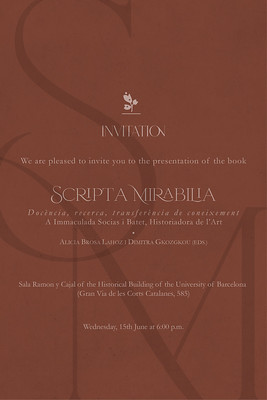 Please find attached your formal invitation to the celebratory event launching the publication of Scripta Mirabilia -- a compendium of homage to Dr. Maria Inmaculada Socias i Batet, Professor Emeritus of the Department of Art History, University of Barcelona.
Please find attached your formal invitation to the celebratory event launching the publication of Scripta Mirabilia -- a compendium of homage to Dr. Maria Inmaculada Socias i Batet, Professor Emeritus of the Department of Art History, University of Barcelona.
Time and Place: Sala Ramon y Cajal, Historical Building of the University of Barcelona, Gran Via de les Corts Catalanes, Wednesday, June 15, 2022, at 6:00 p.m. (CET).
This long-awaited tome of over 700 pages, put together as a labor of love by former students, features more than fifty submissions ranging from personal reminiscences and reflections to serious art-historical studies, offered by her many admirers, associates and fellow scholars in the wide variety of fields of activity, interest and achievement with which Dr. Socias has come to be known, ranging from Medieval, Renaissance and Baroque graphic works to archival and bibliographical investigations, architecture, decorative arts, collectors and collecting, numismatics and philatelics. It is a multi-lingual festschrift with a little something for almost all readers.
A product of the academic press of the famous medieval Benedictine Abbey of Montserrat, although not yet released, the work is already being widely offered by book sellers at about €45 (or $50).
Respectfully submitted, with fond regards,
Robert W. Hoge
(colleague, friend, partner and husband of Dr. Socias)
Citation:
Brosa Lahoz, Alicia, and GkozGkou, Dimitra, eds. Scripta Mirabilia: a Immaculada Socias i Batet - Docencia, recerca, transferencia de coneixement. Barcelona: Publicacions de l'Abadia de Montserrat, 2022. ISBN: 978-84-9191-220-0
NNP ADDS DECORAH NUMISMATIC JOURNAL
The latest addition to the Newman Numismatic Portal is the Decorah Numismatic Journal. Project Coordinator Len Augsburger provided the following report. -Editor
Newman Portal Adds Decorah Numismatic Journal
Through the courtesy of Joel Orosz, Newman Portal has added the Decorah Numismatic Journal, edited by Edward W. Holway of Decorah, IA. Remy Bourne's American Numismatic Periodicals 1860-1960 notes four quarterly issues of the Journal from January to October 1875. This short-lived periodical came and went quickly, but the publishers get credit for sticking to their original commitment. The story is told in the January issue.
Coming into our sanctum one day, we found the following obituary posted in a conspicuous place: DIED / On April 1, 1875 / From lack of subscribers, / The Deocrah Numismatic Journal / Sorely lamented by the Editor, Foreman & Devil. / Success to its cremators, / Peace to its ashes. However, we do not believe in croakers, and, if we live, those malign predictions shall not be verified. This Journal shall be published a year – subscribers or no subscribers.
The publishers were true to their word, and the journal persisted through the end of the calendar year.
Charles Davis, in his November 16, 2013 sale observed Perhaps the rarest of American numismatic periodicals, one has to question why it existed in the first place, other than perhaps to eat up otherwise idle time on a press…Its content dealt primarily with the coins and medals of Germany, not a surprise as Decorah was the home to Luther College.
Holway also shows up in the American Journal of Numismatics, writing on a Swiss Reformation (Zwingli) medal in the April 1875 issue. Pete Smith, in the Summer 2004 Asylum, credits Holway with a single fixed price list, issued in 1875. Holway later appears in the Chapman brothers' business correspondence at the American Numismatic Society – he wrote to the Chapmans on October 30, 1879, on the Winnesheik County Bank letterhead, asking for their ancient coin catalogs. The Chapman's first sale, including ancient coins, took place on October 9 of that year, so this request was likely in response to an announcement of that sale.
Joel adds:
"On rereading the facetious obit,
I'm pretty sure that the reference to the devil is a double pun—referring Beelzebub, of course—but also to the printer's devil, who would naturally have been in mourning for having lost a job."
Image: Decorah Numismatic Journal obituary
included in the January 1875 issue
Link to the Decorah Numismatic Journal:
https://archive.org/details/newmannumismatic?query=decorah+numismatic+journal&sort=-publicdate
VIDEO: 2023 NEW YORK INTERNATIONAL
These are selections from the David Lisot Video Library that feature news and personalities from the world of coin collecting. David has been attending coin conventions since 1972 and began videotaping in 1985. The Newman Numismatic Portal now lists all David's videos on their website at:
https://nnp.wustl.edu/library/multimediadetail/522852
Here's one on plans for the 2023 New York International show. -Editor
Kevin Foley Gives Update on New York International Numismatics Convention (NYINC) for 2023.
VIDEO: 5:32.
Kevin Foley, Convention Chairman,
David Lisot, Interviewer, CoinTelevision.com.
April 1, 2022.
The New York International Coin Convention is considered by many to be the premier coin show for international coin collecting in the United States. Based in New York City the convention attracts dealers from all over the world. General Chairman, Kevin Foley, talks about the Barclay Hotel where the convention is hosted as well as what collectors and dealers may expect at one of America's oldest international conventions.
David adds:
"What better time could be spent with world numismatics in the Big Apple? This convention brings out the elite players trading in ancients and foreign coins. A plethora of auction companies are present. If you are into world coins this event is a must."
An excerpt of the video is available for viewing on the Coin Television YouTube Channel at:
https://youtu.be/A5DQCzIC9mk
COIN WORLD'S 2022 MOST INFLUENTIAL PEOPLE SURVEY
Coin World has opened the 2022 version of its poll helping choose the year's "100 Most Influential People in Numismatics". The resulting article will be published in September as part of a Coin World Annual issue which will also include articles on "100 Top Companies" and "Young Numismatists". Here's the text from the survey's home page - follow the link below to cast your votes. -Editor
Rising to the uppermost echelons comes with unique responsibility for individuals reaching that peak. These individuals hold sway over the numismatic community. They not only influence but shape the industry's values, direction, audience, investments, choices, and decisions. At the same time, many are responsible for their brands or are experts within associations, corporations, and product development with data key to understanding. That understanding has become so incredibly valuable not just to those that enjoy coin collecting, but to the industry as a whole because it drives passion, audience and growth.
That's what the Coin World's 2022 Most Influential People in Numismatics list assesses. We evaluate influence in several ways, looking for innovative ideas, contributions enriching the hobby, leading initiatives that make it better, or via a highly visible role representing their companies. Still others cultivate and share a particular expertise — around customer experiences, transformation or sustainability — that establishes them as a thought-leader on a given topic. Additionally, in selecting these nominees, considerations are given to how long they have been involved and their ability to contribute and serve in ways that benefit the hobby, more than themselves, as well as diversity.
What makes an individual worthy of a spot on a list? Each one of these inspirational people uses the power of their contribution to have an effect on how the hobby works, and their actions and words have made an impact. While you will certainly find people who wield traditional power on this list — heads of organizations, owners, dealers — it also includes many extraordinary, lesser-known individuals who seized the moment to impact the hobby in meaningful ways. Their work challenges each of us to wield our own influence toward a coin world
that is healthier, more resilient, more sustainable and just.
More than 200 influencers are eligible for consideration, all are worthy as they have had an impact on numismatics. Names include collectors, dealers, researchers, authors, club officials, designers, artists, authenticators, graders, journalists, and more. We ask you to assist us by casting your votes to make sure the best of the best
are honored as recipients of Coin World's 2022 Most Influential People in Numismatics.
To cast your votes, see:
Coin World 2022 Most Influential People in Numismatics
(https://survey.alchemer.com/s3/6873386/Coin-World-2022-Most-Influential-People-in-Numismatics)
To read the earlier E-Sylum articles, see:
COIN WORLD'S MOST INFLUENTIAL PEOPLE SURVEY
(https://www.coinbooks.org/v23/esylum_v23n43a21.html)
COIN WORLD ON INFLUENCE IN NUMISMATICS
(https://www.coinbooks.org/v24/esylum_v24n20a08.html)
THE BOOK BAZARRE
MORE ON INSERT DIES
Heath White submitted these additional notes on Insert Dies. Thank you! -Editor
Here are examples of two dies showing what Dick Johnson called an 'Insert Die.' Both of these are from the Fraternal Supplies Company Archives and were used to produce top bars for different medals. The die with serial number 4298 is from M C Lilley and this serial number would date the die to 1922. The die with the 'Wayland Lodge 176' insert still in the die dates to the late 1880's and is most likely from Lilley, but could be from Frank Henderson (Kalamazoo, MI) or E A Armstrong (Detroit).
You will notice in the die without the insert there were two holes drilled through the die. This was so you could push a rod through the bottom of the die and remove the insert.
I don't agree with many of Dick Johnson's descriptions and definitions because what I'm learning to be true is each factory had a different way of doing things. What Dick is describing is the way things were done at factories he was familiar with. In the case of his definition of 'Insert Die' his description may be accurate for how a specific insert die was used to make a specific medal. Much like Merriam Webster giving only one definition to a word with six different meanings. It is misleading and confusing to readers that are trying to learn. That said, I value and respect the contributions and efforts Dick made to educate others and share his knowledge.
Here are pictures of the bottom and side of the 'Wayland Lodge' die. The bottom view shows the two holes drilled through the die used to remove the insert. The side view shows 'S H BROWN - MAKER - BOSTON'. Samuel H Brown was a blacksmith and die maker in Boston. I could only find him listed in business from 1887 to 1891 so I would date this die to late 1880's to early 1890's. Attached is also a help wanted ad for Samuel H Brown from 1889.
As a die maker, Samuel Brown would have only forged the die blanks. Samuel Brown did not put the design in the top of the die and he did not produce stamped goods. He sold his dies to a company like The M C Lilley & Company where the die was engraved, then used to produce stamped goods. Sometimes this involved three companies. . . die maker, die sinker, & manufacturer of stamped goods. Larger companies like Lilley did both engraving and stamping.
To read the earlier E-Sylum article, see:
VOCABULARY TERM: INSERT DIE
(https://www.coinbooks.org/v25/esylum_v25n20a12.html)
NOTES FROM E-SYLUM READERS: MAY 22, 2022
Pinches of London Dickeson Continental Dollar Restrikes
Jeff Shevlin writes:
"Tom DeLorey's comments on the Dickeson restrikes are correct. Mr. Bowers told me 15 years ago that he wasn't certain, but almost positive, that the 7,200 White Metal Dickeson restrikes were struck for his company Empire Coin Company by Pinches of London. Advertisements placed by Empire Coin when they were selling the Dickeson Restrikes stated they were struck from the original Dickeson dies."
Thanks for the confirmation. -Editor
To read the earlier E-Sylum article, see:
https://www.coinbooks.org/v25/esylum_v25n20a08.html : On Restrikes of the Dickeson Continental Dollar
(https://www.coinbooks.org/v25/esylum_v25n20a08.html)
More on Kamberra Fantasy Banknotes
Chip Howell writes:
"The colorful Kamberra banknote appears to be fantasy work of a graphic artist."
It took a LOT of scrolling, but I found this note in an October 24, 2015 post. Some beautiful fantasy notes here - great work by artist Franck Medina. -Editor
To read the complete Facebook description, see:
Kamberra Banknotes
(https://www.facebook.com/people/Kamberra-Banknotes/100035986151508/)
Wayne Pearson sent this link. Thanks, everyone. -Editor
Banco De Kamberra, FANTASY ISSUE
50 Numismas, 2016, Polymer (bi-axially oriented polypropylene) Year of the Monkey, Chinese Lunar Calendar
This spectacular polymer banknote has been created by the renown French graphic artist Mr. Frank Medina. It continues the series of Chinese Lunar Calendar, bring the number of issued banknotes in that series to seven. All banknotes are limited issues and are retired after a brief period of issue.
To read the complete item description, see:
Banco De Kamberra 50 Numismas - 2016 Year of the Monkey - Fantasy Issue Polymer Note
(https://www.collectorscurrency.com/item/2028)
To read the earlier E-Sylum article, see:
NUMISMATIC NUGGETS: MAY 20, 2022 : Kamberra Year of the Monkey Note
(https://www.coinbooks.org/v25/esylum_v25n20a20.html)
Belden's 1930 Philadelphia Mint Research
Roger Burdette writes:
"I was wondering if any of your readers had information about the research ANS was doing."
The February 12, 1930 letter to American Numismatic Society Curator Howland Wood from the Acting Mint Director mentions Mr. Belden's "research work at the Philadelphia Mint."
Bauman Belden was an officer of the ANS for many years through 1928 and in 1930 published A Mint in New York. Can anyone shed light on this research at the Mint? Thanks. -Editor
The Other Continental Dollar
Jeff Shevlin writes:
"With all of the interest in the Bashlow/Dickeson dies etc., Bill Hyder's and my recent article, that was published as the cover article of The Numismatist in October, 2021 may be worthy of recognition. It identifies why they are historically significant, why and when they were struck, who struck them, etc."
Thanks. Great article - check it out. -Editor
To read the earlier E-Sylum article, see:
https://www.coinbooks.org/v25/esylum_v25n20a08.html : On Restrikes of the Dickeson Continental Dollar
(https://www.coinbooks.org/v25/esylum_v25n20a08.html)
SAN FRANCISCO'S EMPEROR NORTON
Levin Messick submitted some notes about San Francisco's Emperor Norton. Thanks. -Editor
I enjoyed the article about General Sherman. He came to California during the days of '49. He was indeed a banker and he was forced by the Panic of 1857 to call in all loans in an attempt to save his bank. The attempt failed. Another failure was a certain Joshua Norton. He had attempted to corner the rice market in San Francisco. But a ship arrived in the harbor loaded with rice. So, Norton's scheme failed and Uncle Billy foreclosed on him and basically got nothing.
So, Sherman went back east and Norton disappeared after suffering a mental breakdown. He would return, in 1860, as Norton I Emperor of the United States and Protector of Mexico. He would become a beloved "character" in San Francisco where he had an Imperial Box at the theatre and attended the openings of the State Legislature, in Sacramento, where he was provided a "throne". The "Big Four" railroad barons provided him a free pass for transit and railroad journeys. The city provided him a uniform and ceremonial sword. He corresponded with Queen Victoria, Presidents Lincoln, Jefferson Davis, and Benito Juarez, of Mexico.
It was said that his funeral procession, in the 1880's was attended by ten thousand citizens. For banknote collectors it is an outstanding accomplishment to obtain a Norton Banknote. He issued Imperial notes to pay his way and they were accepted by virtually anyone in the city who received one. Today they are both rare and highly desired by obsolete currency collectors.
Sherman, of course, would partner up with two other business failures named Lincoln and Grant to win the Civil War. Some years later when Sherman was asked why he had business dealings with a crazy man such as Norton; he is reported to have replied: "Well we were all a little crazy then"
Norton had an Imperial request for the consideration of the Legislature. He desired that they should build a suspension bridge across the Golden Gate. A group out here called E Clampus Vitus has created a plaque for the Golden Gate Bridge that notes Norton's circa 1880 command to build it. Many SF residents have asked the powers that be to call it the Emperor Norton Bridge. So, we are all still a little crazy out here! LOL"
Lev adds:
"My wife attended Chapman University and had a history class with Professor "Killer Miller." He taught there 50 years. He was not noted for dispensing high grades. She did a paper on Norton for his class which put him over the Moon. He told her that none of his students had ever covered Norton before and she got an A."
I'm a longtime Norton fan myself, having learned about him through numismatics - Norton issued those paper "bonds" to raise funds, and tourists to San Francisco were often buyers, having learned of him and his exploits through newspaper accounts.
Our resident Norton expert is John Lumea of the Emperor Norton Trust. While much has been written about Norton over the years, separating fact from the considerable lore and fiction can be difficult. John kindly agreed to set some things straight for us. I've mangled many of these facts myself based on what I'd read over the years in the various books and articles about Norton. Some are minor points but all are worth correcting to keep the historical narrative on track. -Editor
"But a ship arrived in the harbor loaded with rice."
Near-daily "Importations" lists published in the Daily Alta show that a succession of ships with rice cargoes large and small arrived in San Francisco in the days and weeks after Norton and his partners contracted to buy the Glyde's 200,000 lb. cargo on 22 December 1852. The momentary glut was cumulative — not based on one ship.
"So, Sherman went back east and Norton disappeared after suffering a mental breakdown. He would return, in 1860, as Norton I Emperor of the United States and Protector of Mexico."
The language of "disappearance" and "return" is misleading. Norton's public profile did recede in the period following his declaration of bankruptcy in August 1856. But, it appears that he remained in San Francisco the whole time, and there is no evidence to suggest otherwise. Norton hand-delivered his Proclamation declaring himself Emperor to the San Francisco Daily Evening Bulletin on 17 September 1859 (not "in 1860"), and the Bulletin published the Proclamation in that evening's edition. The Emperor added "Protector of Mexico" in 1863, following Napoleon III's invasion of the country in late 1862 and subsequent installation of his puppet, Maximilian. For more on Norton's local activities in San Francisco between 1856 and 1859, see my recent article.
"He would become a beloved "character" in San Francisco where he had an Imperial Box at the theatre"
There were many theaters in San Francisco. Although individual theater owners did seek to promote new shows by providing the Emperor with complimentary tickets, this was not a universal practice — and, I've never seen a reference to any theater having an "Imperial Box."
"... and attended the openings of the State Legislature, in Sacramento, where he was provided a "throne"."
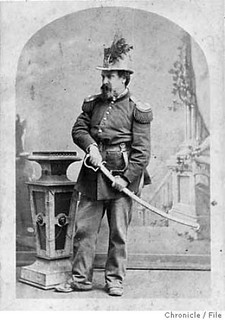 Emperor Norton made numerous visits to Sacramento. Newspaper reports of these visits indicate that his itineraries always included the Capitol, where he observed proceedings of the Legislature. He did so from the galleries, like any other visitor. But, although the Emperor's visits do seem to have been regarded as special occasions, I've never seen a reference to any "throne" or other special seating.
Emperor Norton made numerous visits to Sacramento. Newspaper reports of these visits indicate that his itineraries always included the Capitol, where he observed proceedings of the Legislature. He did so from the galleries, like any other visitor. But, although the Emperor's visits do seem to have been regarded as special occasions, I've never seen a reference to any "throne" or other special seating.
"The city provided him a uniform and ceremonial sword."
Apparently not. See my new article on this.
"He corresponded with Queen Victoria, Presidents Lincoln, Jefferson Davis, and Benito Juarez, of Mexico."
There is some evidence that Emperor Norton tried to send telegraphs to these and other leaders. But, it seems that the "responses" the Emperor received were drafted and sent to him as pranks by the telegraph operators, who never sent his original messages.
"He issued Imperial notes to pay his way and they were accepted by virtually anyone in the city who received one."
There is no evidence that this was anything like a universal practice. Emperor Norton's promissory notes served a variety of purposes. Occasionally, when the Emperor collected from business owners, bankers, lawyers and such the tributes that he called "taxes," he used the notes as receipts, suggesting that he regarded these "taxes" as investments in the Empire. He sold the notes in the streets to tourists and townsfolk alike, who purchased them primarily for the souvenir value of his signature.
There appears to be no evidence that any of these people — "taxpayers," tourists or townsfolk — did anything with the notes other than to save them as mementos. Probably the only person who tried to spend them was Emperor Norton himself. Even then, the notes would have been accepted only by sympathetic proprietors who considered themselves friends or supporters of the Emperor — similar to saloon keepers who waved him through the free-lunch line without paying the one-drink fee, because (a) they had a soft spot for the Emp and (b) it was good for business to have him as part of the rotating cast.
"Norton had an Imperial request for the consideration of the Legislature. He desired that they should build a suspension bridge across the Golden Gate."
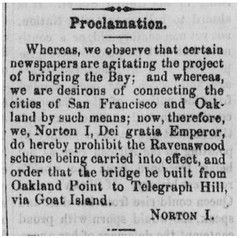 Emperor Norton issued three Proclamations in 1872 setting out the vision for what opened as the San Francisco–Oakland Bay Bridge — not the Golden Gate — in November 1936. The Proclamations — published in the Pacific Appeal newspaper — don't mention the state legislature, and I've seen no evidence that the Emperor made any separate appeal to Sacramento. The only government bodies he references — in the third of the three Proclamations — are "both the Boards of City Fathers" of San Francisco and Oakland. You can see and read the Proclamations
here.
Emperor Norton issued three Proclamations in 1872 setting out the vision for what opened as the San Francisco–Oakland Bay Bridge — not the Golden Gate — in November 1936. The Proclamations — published in the Pacific Appeal newspaper — don't mention the state legislature, and I've seen no evidence that the Emperor made any separate appeal to Sacramento. The only government bodies he references — in the third of the three Proclamations — are "both the Boards of City Fathers" of San Francisco and Oakland. You can see and read the Proclamations
here.
"A group out here called E Clampus Vitus has created a plaque for the Golden Gate Bridge that notes Norton's circa 1880 command to build it."
 Again, the plaque is a tribute to Emperor Norton's vision for the Bay Bridge — not the Golden Gate. And, the Emperor issued his Proclamations in 1872 — not 1880. Interesting sidebar: When the Clampers commissioned and dedicated their plaque in 1939, the "bridge Proclamations" of 1872 had yet to find their way into the historical narrative. The only decree anybody knew about — and the one whose 1869 date is memorialized on the plaque — later was shown to be a fake decree published by the Oakland Daily News as a joke at San Francisco's expense. It had the Emperor calling for a ridiculously long bridge meandering from Oakland to Goat Island (Yerba Buena Island) to Sausalito to the uninhabited Farallon Islands off the west coast of San Francisco — and bypassing San Francisco altogether. The original bridge to nowhere! You can read about the background and history of the plaque
here.
Again, the plaque is a tribute to Emperor Norton's vision for the Bay Bridge — not the Golden Gate. And, the Emperor issued his Proclamations in 1872 — not 1880. Interesting sidebar: When the Clampers commissioned and dedicated their plaque in 1939, the "bridge Proclamations" of 1872 had yet to find their way into the historical narrative. The only decree anybody knew about — and the one whose 1869 date is memorialized on the plaque — later was shown to be a fake decree published by the Oakland Daily News as a joke at San Francisco's expense. It had the Emperor calling for a ridiculously long bridge meandering from Oakland to Goat Island (Yerba Buena Island) to Sausalito to the uninhabited Farallon Islands off the west coast of San Francisco — and bypassing San Francisco altogether. The original bridge to nowhere! You can read about the background and history of the plaque
here.
"Many SF residents have asked the powers that be to call it the Emperor Norton Bridge."
Gratuitous promotion: 2022 is the 150th anniversary of Emperor Norton's "bridge Proclamations" of 1872. The Emperor Norton Trust is urging state lawmakers to use this once-in-our-lifetimes symbolic opportunity to simply add "Emperor Norton Bridge" as an honorary name for the San Francisco–Oakland Bay Bridge — leaving in place all existing names and signage for the bridge and its constituent parts ("spans," tunnel, etc.).
Those interested in supporting this effort can go to EmperorNortonBridge.org, where they'll find button links to "Learn More" and "Sign the Petition."
An excerpt from John's new article on Norton's uniform appears elsewhere in this issue. Thanks for sorting this out, John. We'll give you an "A+"!! -Editor
Lev adds:
"Well, I have no problem with corrections. Norton did attend the meetings of the State Legislature. Please note that "throne" was in quotation marks. It was a chair. With the "Emperor" sitting in it- it became a "throne". As to where he actually sat I have not seen any information anywhere on the exact spot!
"He did have a lifetime railroad pass. Norton's net worth was given as $250,000.00 Circa 1853. That would be $8.2 Million in today's money. So, I think that most of the business men in SF who were not comatose (LOL) probably knew him very well. Further, another article pointed out that he actually held one or more railroad locomotive patents. These would of course have provided income. I have not had the time to research that information so it may or may not be true. Patents are public record but going back that far is time consuming. Something for me to do in the summer.
"Now, there is a rather extensive article on Norton that was published in "Money Talks" pages 40-49. The book was published by the California State Numismatic Association, in 1970, and was edited by the late James L. Betton. The article by the late Fred Marckhoff, of Elgin, Illinois is, in some cases, at odds with other sources. It seems that the U.S. Army post in SF issued new brass buttoned and gold braided uniforms to the Emperor when his old ones wore out.
"Mr. Marckhoff also noted the serial number runs of each note/bond printing and how many of each note were issued and actually used or not. This, of course does not indicate how many still exist.. Mr. Marckhoff does give very extensive information regarding Norton's birth, life in South Africa, life as a well known and respected businessman, in SF, and his business dealings as well as those of his business partners, and court proceedings, all dated and documented. Mr. Marckhoff pointed out that his business partners, in the rice fiasco, did not suffer any ill consequences due to faulty wording in the contract document.
"Norton, like Daniel Boone and Davy Crockett was a real person who became a legend. He is one of California's most beloved and wonderful characters and like all such characters grows ever larger in the telling! Down here in Southern California we have Mickey Mouse, Bugs Bunny, and Wile e Coyote! They all have postage stamps! Maybe we could get Norton a commemorative coin."

I, for one, would line up to buy an Emperor Norton commemorative coin. He was my kind of crazy, and I'd buy him a drink just to hang out and philosophize sometime. We should have an Emperor Norton impersonator at major coin shows - he could sell souvenir bonds and tokens to pay his expenses. Nothing like a little cosplay to liven things up, as we've already seen with Ben Franklin, Abe Lincoln and King Alanus of Bermania. -Editor
For more information, see:
Name It the Emperor Norton Bridge
(http://emperornortontrust.org/emperor-norton-bridge)
A Plaque in 1939
(http://emperornortontrust.org/bridge/historical-efforts/1939)
EMPEROR NORTON BRIDGE :: Bridge Proclamations
(http://emperornortontrust.org/bridge/proclamations)
A New State of Things?
A Pre-Imperial Proclamation from Joshua Norton in July 1859
(http://emperornortontrust.org/blog/2022/3/8/a-pre-imperial-proclamation-from-joshua-norton-in-july-1859)
Did San Francisco City Government Really Buy Emperor Norton a New Suit?
(http://emperornortontrust.org/blog/2022/5/18/did-san-francisco-city-government-really-buy-emperor-norton-a-new-suit)
To read earlier E-Sylum articles, see:
EMPEROR NORTON'S BRIDGE
(https://www.coinbooks.org/esylum_v17n23a36.html)
NOTES ON EMPEROR NORTON'S PRINTERS
(https://www.coinbooks.org/v20/esylum_v20n19a29.html)
EMPEROR NORTON 50 CENT BOND DISCOVERED
(https://www.coinbooks.org/v22/esylum_v22n46a28.html)
BOOK REVIEW: PLEASE IGNORE OUR TIME MACHINE
(https://www.coinbooks.org/v23/esylum_v23n28a07.html)
PAN CIVIL WAR SHOWCASE UPDATE
(https://www.coinbooks.org/v25/esylum_v25n19a10.html)
EXTENDING THE PRESIDENTIAL DOLLAR SERIES
Reader Wayne Pearson thinks a lot about U.S. coin and paper money designs. Here are his latest out-of-the-box ideas for the Presidential dollar series. -Editor
When the state quarter program started, most people deciding to collect them had the reasonable expectation to live for those ten years.
When the presidential dollar coin program was conceived, it was obvious that no one would be able to complete the collection.
Here is an idea for everyone to complete the collection and stay current.
For all of the living presidents, a dollar coin of them in profile, with their presidential #number and dates served.
Each coin needs to look like a coin-meaning they need to be in profile with all of the correct writings in the right places. LIBERTY, IN GOD WE TRUST and the date on the obverse and E PLURIBUS UNUM on the reverse.
For living presidents, the coin would be issued at the start of their term with the date the term started and a STAR added to denote the coin was issued while they were in office.
If we want to add the president's name, we could employ the edge lettering.
For the reverse, the same Statue of Liberty design with E PLURIBUS UNUM added.
I realize we do not put living people on coins-this would be the exception. And once every four to eight years we would have another new presidential dollar coin. Like them or hate them, your collection would be complete.
And it could even be exciting to see some history taking place right before our eyes.
Otherwise, at this point, certain living presidents will outlive all of us.
The same approach could be done for the first spouse gold coins.
As long as the money raised goes to the National Debt, we are not competing with the bullion program.
Dollar coin examples A) and B) based on
https://www.worthpoint.com/worthopedia/george-washington-1732-1799-medallic-1799761032
Reverse design C) based on
http://www.supercoloring.com/coloring-pages/one-dollar-coin-with-statue-of-liberty
Martha Washington example D) and E) based on
https://www.govmint.com/2pc-2019-50-cent-martha-washngtn-1759-ngc-ms70
Coincidentally, yesterday I saw this post on Reddit by an architecture student with an idea for a new Dollar coin design. I like it. Check out the full discussion thread - very interesting. -Editor
In addition to coin collecting, coin designing has been an interest of mine. I don't think any classical depiction of the Goddess of Liberty will return to our circulating coinage again, but the Mint has already pretty much decided that the contemporary depiction of Liberty is the Statue of Liberty in New York. While I like that idea (a nice change from less than photogenic frontal profiles of old men), the reverse of the Presidential and American Innovators coins leave a lot to be desired. Instead I wanted to create the feel of an older coin using the Statue of Liberty in profile, with her arm aloft rendered in lower relief. The end result looks almost French, which is quite pleasant in my opinion.
The reverse could be some commemorative thing like what we currently do, or the Sacagawea reverse, which I think is one of the most beautiful designs of any American coin, let alone within the past few decades.
To read the complete discussion thread, see:
Had an idea for a new Dollar coin design so I made one
(https://www.reddit.com/r/coins/comments/uunber/had_an_idea
_for_a_new_dollar_coin_design_so_i/)
VOCABULARY TERM: INSTITUTE OF HERALDRY
Here's another entry from Dick Johnson's Encyclopedia of Coin and Medal Terminology. I added the Institute of Heraldry's coat of arms because, of course, they have one. -Editor
Institute of Heraldry. Medals, decorations, badges, insignia, seals of the United States Government – the official symbolic items for award, wear or display – are the responsibility of The Institute of Heraldry. Under the administration of the Department of the Army, the Institute furnishes heraldic services to all Armed Forces, other U.S. government organizations, and limited services to the general public.
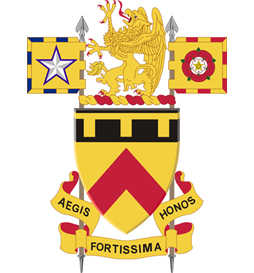 Creating heraldry symbols for military and government organizations for the most part, The Institute of Heraldry's service also include research, design, development, standardization, quality control and other heraldry functions. The Institute employees artists, sculptors, model makers and heraldry specialists, all civilians despite its connection with the U.S. Army. It maintains an archive of all items under its control and provides for the storage of original models, hubs, dies and tooling.
Creating heraldry symbols for military and government organizations for the most part, The Institute of Heraldry's service also include research, design, development, standardization, quality control and other heraldry functions. The Institute employees artists, sculptors, model makers and heraldry specialists, all civilians despite its connection with the U.S. Army. It maintains an archive of all items under its control and provides for the storage of original models, hubs, dies and tooling.
The Institute maintains a "bid list" of American manufacturers who actually produce the medals, badges, insignia, whatever is required. Each new item is put out for bid from drawings and specifications prescribed by The Institute. Those manufacturers who wish can bid on the production of these items; including the manufacture of the administration it assigns unique hallmarks to each manufacturer.
Established in 1960, The Institute of Heraldry also furnishes information to anyone on the authorization, use, history and traditions of official government and military symbolic items. The Institute maintains a large reference library and archives. It is located at Fort Belvoir, formerly at Cameron Station, both in Virginia and is under the management of a military director.
To read the complete entry on the Newman Numismatic Portal, see:
Institute of Heraldry
(https://nnp.wustl.edu/library/dictionarydetail/516158)
ROBERT BASHLOW, PART FOUR
American Numismatic Biographies author Pete Smith submitted the fourth and final article of his series on Robert Bashlow, known in numismatics for, among other things, creating satirical medals and restrikes of the Confederate cent. Thanks! -Editor
On July 12, 1979, fire broke out at the five-star Corona de Aragon Hotel in Zaragoza, Aragon, Spain. The three hundred guests included the widow of General Franco and high-ranking military officers. That is well-documented fact. Many details remain uncertain and controversial.
An official government source stated that the fire started accidentally with an explosion in twenty litres of cooking oil in a pastry machine in the cafe. Two opposition groups claimed responsibility and terrorism was also suspected.
The official death toll was more than eighty but there was speculation that some who died later were not counted. Most of the victims were Spanish citizens. The one American victim was Robert Bashlow of New York.
In one of his columns in The Numismatist, Bowers included a letter from Hans M. F. Shulman.
"I read your article about poor Bashlow. He was a friend of mine, and we did a lot of business together. He came to Spain after his trip to Portugal. I was in Spain at the time and found out additional tragic information about his death. Bob went to Zaragoza to the Hotel Corona de Aragon (Crown of Aragon) where he was to meet two dealers from Barcelona whose names I never managed to get. They planned a very early meeting at the hotel, around 7 a.m.
"Bashlow was tired because of his traveling to so many places. The two Catalonians arrived in Zaragoza early, and they woke up Bashlow on the hotel telephone. At 7:30, smoke was coming out of the hotel on both the left and right sides and also from the main entrance. One of the Catalonians ran up the staircase through heavy black smoke to get Bashlow out of his room. When he and Bashlow did not come out, the second Catalonian went into the burning building. None ever came back."
There has been misinformation published after the death of Bashlow. There was speculation that Bashlow faked his death to escape debt or to distance himself from scandal. This is highly unlikely considering the public scrutiny that followed the hotel fire.
In his memories of Bashlow, Q. David Bowers reported that Bashlow died in Portugal. That was incorrect.
Russell Rulau wrote in Numismatic News for February 16, 1999, he died in a mysterious hotel
fire is Spain in which he was the only fatality.
This was also incorrect.
In attempting to write the stories of Bashlow, there were questions I could not answer.
The Newman Numismatic Portal has hundreds of citations for Bashlow and his activities of 1961 to 1963. Most relate to the second restrike Confederate cent. There is almost nothing for activities after 1965 and I could not find a published obituary. [Numismatic News published his obituary on July 28, 1979.]
Most numismatic writing is for readers who are interested in the luster of the hobby. Few want to read about the flaws that may be lurking beneath the surface. An informed numismatist will want to know about those flaws.
Many of us can tell tales of a mentor in numismatics. In this article I mentioned Doctor William H. Sheldon who was a mentor to Walter Breen who in turn was a mentor to Robert Bashlow and Lynn Glaser. These were two older men who made great contributions to the hobby and two young men with potential to do the same.
In each case there were flaws in their character that appeared after their luster had tarnished. If there was a balance sheet showing plusses (assets) and minuses (liabilities), which side would have the larger balance? I never met Robert Bashlow. I would be interested to hear from E-Sylum readers who can tell more about him.
As time marches on, there are fewer and fewer old timers around who can tell us more about the other old timers. I knew Walter Breen a bit, spoke with Lynn Glaser by phone once, but never crossed paths with Bashlow. Can anyone help? -Editor
To read the earlier E-Sylum articles, see:
ROBERT BASHLOW, PART ONE
(https://www.coinbooks.org/v25/esylum_v25n18a15.html)
ROBERT BASHLOW, PART TWO
(https://www.coinbooks.org/v25/esylum_v25n19a16.html)
ROBERT BASHLOW, PART THREE
(https://www.coinbooks.org/v25/esylum_v25n20a13.html)
MORE BASHLOW PRODUCTIONS
Steve from #1 Money Man submitted these notes and images of some Robert Bashlow productions. -Editor
To add to the multipart article on Bashlow, here are a few comments/pictures of items that were referred to.
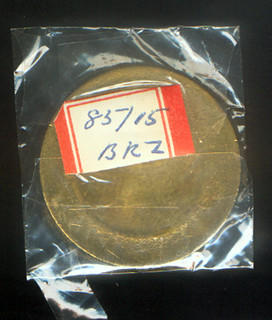 1 – Obverse & Reverses of some of the Confederate Cents which Bashlow produced in a variety of metals. Shown is copper & goldine, in their original wrappers with the reverse notation of the actual metal contents.
1 – Obverse & Reverses of some of the Confederate Cents which Bashlow produced in a variety of metals. Shown is copper & goldine, in their original wrappers with the reverse notation of the actual metal contents.
2 – Also depicted is a (front & back) CSA Cent ingot brick made and numbered (this one shown is # 43 which we sold 5 or 10 years ago) by A. Frank of Philadelphia.
3 – In the ‘Pope We Hope' Gold medal. Bashlow would make 3 copies of the various productions. One to be sold, another for his personal collection and the last to the Smithsonian.
The gold example of the CSA Cent was sold by Heritage for Bunny Laties 11 years ago for about $21,000 with a write-up by his brother David, about this 1961 re-strike."
We often have a few Bashlow items at our ‘# 1 Money Man' table during Winter FUN.
Thanks! -Editor
To read the earlier E-Sylum article, see:
ROBERT BASHLOW, PART THREE
(https://www.coinbooks.org/v25/esylum_v25n20a13.html)
UPCOMING NUMISMATIC EVENTS: MAY 22, 2022
Here are announcements of some current and upcoming numismatic events around the world.
- Numismatics Seminar: Greece After Rome, a free one-week course on coinage in medieval Greece
- Beyond Greece and Rome is a CoinWeek podcast on the ancient coinage of the Persians, Phoenicians and Carthaginians
- Coins and the Colosseum is a YouTube video of ANS Long Table presentation by Richard M. Beleson
- An Interview with John Kraljevich is a Coin World podcast
Numismatics Seminar: Greece After Rome
Alan Stahl will be teaching a one-week course on coinage in medieval Greece at Princeton's Athens Center, during the first week of July. Non-credit and no tuition, open to a wide variety of interested people. Deadline for applications is May 27; follow the link for more information:https://hellenic.princeton.edu/opportunities/summer-institute-%E2%80%9Cnumismatics-seminar-greece-after-rome%E2%80%9D-princeton-athens-center-july
Mike Markowitz on Byzantine Coins
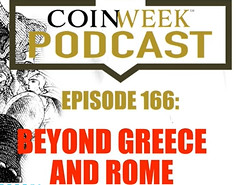 This week on the CoinWeek Podcast, CoinWeek's ancient coin expert Mike Markowitz sits down to take us beyond the realms of Greece and Rome to tell stories of the coins of the Persians, the Phoenicians, and the Carthaginians.
This week on the CoinWeek Podcast, CoinWeek's ancient coin expert Mike Markowitz sits down to take us beyond the realms of Greece and Rome to tell stories of the coins of the Persians, the Phoenicians, and the Carthaginians.
To listen, see:
CoinWeek Podcast #166: Beyond Greece and Rome
(https://coinweek.com/ancient-coins/coinweek-podcast-166-beyond-greece-and-rome/)
Coins and the Colosseum
ANS Fellow Richard M. Beleson will present a collector's perspective on coins relating to the Flavian Amphitheater, also known as the Colosseum. He will give a comprehensive review of coins that depict the Colosseum or relate to its history. In addition to discussing the Colosseum, he will discussa day at the Colosseum,a history of the Colosseum, and the legacy of the Colosseum.
To watch, see:
Long Table No. 92 Coins and the Colosseum
(https://www.youtube.com/watch?v=ypgtmXhHsKE)
An Interview with John Kraljevich
Jeff and Chris catch up with John Kraljevich, asking him about the record-breaking sale of the Daniel Morgan at Cowpens medal and his forthcoming book. They review the May 16, 2016 edition of Coin World and discuss a piece of commemorative coin legislation introduced to Congress.
To listen, see:
"A good story. Period." — An interview with John Kraljevich
(https://www.coinworld.com/news/us-coins/cwpod_ep164)
CNG FEATURE AUCTION 120 RESULTS
Here's the post-sale press release for Classical Numismatic Group's Auction 120, which closed May 11-12, 2022. -Editor
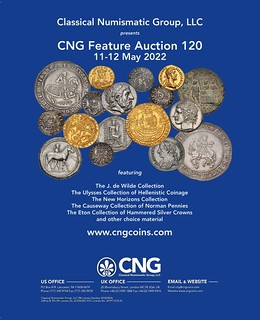 A gold
A gold Zodiac mohur
of the Mughal Indian ruler Jahangir reached $180,000, and three exceptional collections of English coins drew frenzied bidding, driving prices realized in Classical Numismatic Group's Feature Auction 120 to more than $4.8 million, more than double the presale estimate.
The auction, held as a live streaming event on
www.cngcoins.com on May 11-12, comprised more than 1,300 lots of ancient Greek, Central Asian, Roman, Byzantine, World and British coins, many of which attained several multiples of estimate. The market remains vibrant,
said Michael Gasvoda, Managing Director. The results from CNG 120, coming in at 200 percent of estimate, keeps us excited for the future of collecting.
Of particular note was the strong performance of several specialized collections related to Britain, including the Paul Dimarzio Collection of Roman coins from the London mint, the New Horizons Collection of English hammered coinage, the Causeway Collection of Norman pennies, and the Eton Collection of Tudor and Stewart-era hammered crowns. The thing that stands out for me is not just how CNG gets great results with nice quality coins, but how we truly stand out with specialized collections like no one else,
Gasvoda said. DiMarzio, New Horizons, Causeway and Eton all performed exceedingly well. It's what we do best.
Among outstanding results for Ancient coins from Feature Auction 120 were:
Lot 16, a beautiful silver Nomos of Tarentum, attained $26,400
Lot 134, a spectacular silver Tristater of the early Macedonian king Alexander I, reached $84,000:
Lot 162, another Macedonian coin, this one a silver tetradrachm in the name of Philip II and struck under Kassander (317-305 BC), achieved $19,200
Lot 415, an extremely rare gold Stater struck by the Seleukid kings Seleukos I and Antiochos I, was bid up to $84,000
Lot 917, a hoard of 1,485 Roman silver and billon coins found in English Bicknor, Gloucestershire, was bid to $24,000
Lot 956, a remarkable Roman silver medallion of Constantine I the Great,
sold for $31,200
Lot 1051, an extremely rare Zodiac
gold Mohur of the Mughal Emperor Jahangir, depicting the sign of Sagittarius the Archer, achieved $180,000, the top price for any coin in the auction
Lot 1266, another $20,400 for an impressive silver Crown of Charles I struck 1643 at Oxford, from the Eton Collection
All prices quoted include the 20% buyer's premium.
Another 1,143 coins, many from some of the same outstanding collections, can be found in CNG's Electronic Auction 516, closing on Wednesday, May 18; also CNG's Islamic Auction I, featuring 224 historic coins from the world of Islam, closes on Wednesday, May 25.
Consignments are being sought for the next Feature Auction 121, to be held 6-7 October in Lancaster, PA, and for Triton XXVI, scheduled for January 2023 in conjunction with the New York International Numismatic Convention.
CNG can be contacted via email at cng@cngcoins.com, and via phone at (717) 390-9194.
To read the earlier E-Sylum article, see:
CNG FEATURE AUCTION 120 HIGHLIGHTS
(https://www.coinbooks.org/v25/esylum_v25n19a22.html)
ATLAS NUMISMATICS MAY 2022 SELECTIONS
Atlas Numismatics has updated their website with 153 new coins, medals, and tokens at fixed prices. Selections include the following items. Some beautiful pieces! -Editor
Napoleon Pattern 100 Francs
1067493 | FRANCE. Napoleon. (Emperor, 1804-1814). 1807 AE Pattern 100 Francs. PCGS SP65BN (Brown). By H. Vassalo. Edge: Plain. 11.94gm. • NAPOLEON EMPEREUR// 1807. Roman style bust to right, inscribed H.VAS.F on truncation / EMPIRE – FRANCAISE// 100 • FRANCS. Crown above eagle facing right. Mazard 601b; Bramsen 677 variant.$3,950
To read the complete item description, see:
https://atlasnumismatics.com/1067493/
Sharply Struck Edward III Noble
1068252 | GREAT BRITAIN. England. Edward III. (King, 1327-77). (1361-69)-C AV Noble. PCGS MS65. Calais. 7.69gm. ED-WARD DEI GRA REX ANGL DNS HYB Z AQ T. King standing in ship with upright sword and quartered shield, variety without flag in ship, legend and beaded circle surrounding, saltire stops both sides / +IHC AVTEM TRANSIENS PER MEDIV ILLORVM IBAT. Mintmark "C" at center of ornamental cross; a lis in each terminal, crowns over lions in angles, all within a beaded and linear tressure, fleurs in spandrels. SCBC-1505; North 1235; Schneider 96. Treaty Period, Group b.$39,500
To read the complete item description, see:
https://atlasnumismatics.com/1068252/
Attractively Toned George III Shilling
1067459 | GREAT BRITAIN. George III. (King, 1760-1820). 1787 AR Shilling. PCGS MS64. Edge: Milled. GEORGIVS · III · - DEI · GRATIA ·. Armored laureate bust right; dot above head / F · D · B · ET · L · D · S · R · I · A · T · ET · E · - M · B · F · ET · H · REX ·. Hearts in Hanoverian shield; seven harp strings. KM 607.2; SCBC-3746; ESC- 2129 (Prev. ESC-1225A).$895
To read the complete item description, see:
https://atlasnumismatics.com/1067459/
Unique Royal Mint Trial
1068864 | GREAT BRITAIN. Elizabeth II. (Queen, 1952-present). 2021 AV 100 Pounds 1 oz. Bullion Die Trial Piece. NGC PR69DPL (Deep Prooflike). By Jody Clark (Obv.). The Royal Mint. Edge: Reeded. 32.96mm. 31.21gm. Crowned bust, right / Small crowned bust and legend surrounded by all ten of The Queen's Beasts in one design.The Queen's Beasts. Struck in 999.9 fine gold. Unique.
The obverse carries the ROYAL MINT TRIAL stamp as well as production hallmarks in the fields. Includes original case and Certificate of Authenticity No. 1. This is a Limited Edition Presentation of 1.
$14,500
To read the complete item description, see:
https://atlasnumismatics.com/1068864/
Florentine Academy of Fine Arts Medal
1067591 | ITALIAN STATES. Kingdom Of Napoleon. (c. 1812) AR Medal. PCGS SP65. By Carlo Siries. Florence. Edge: "BOGGIO MARCELLO 6 LUGLIO 1888 1° PREMIO DI SCULTURA". 45mm. 35.23gm. UN' EMULA VIRTU GLI ANIMI ACCENDA. Bust of Florence as Minerva wearing lifted helmet and mail, right / ACCADEMIA FIORENTINA DELLE BELLE ARTI.*. Three wreaths intertwined, one of oak, two of laurel. Julius 2569; Turricchia 834.Award medal minted for the Florentine Academy of Fine Arts; The reverse is based on earlier medals by Santarelli, c. 1812. $895
To read the complete item description, see:
https://atlasnumismatics.com/1067591/
Prooflike 1905 100 Lire
1068508 | ITALY. Vittorio Emanuele III. (Emperor, 1900-1946). 1905-R AV 100 Lire. PCGS MS62PL (Prooflike). By Filippo Speranza. Rome. Edge: Reeded. Head left; signed below truncation / Crowned eagle with Savoy shield on chest. KM 39; Friedberg 22.$37,500
To read the complete item description, see:
https://atlasnumismatics.com/1068508/
Choice Charles IV Mexico 8 Escudos
1067824 | MEXICO. Charles IV. 1807-Mo TH AV 8 Escudos. PCGS MS63. Mexico City. CAROL · IIII · D · G · ... Armored bust right / IN · UTROQ · ... Crowned shield flanked by 8 S in order chain. KM 159; Fr.-43; XC-1044.Housed in an old PCGS holder (3.1 Generation green label).
$9,750
To read the complete item description, see:
https://atlasnumismatics.com/1067824/
Updates to their online inventory are issued monthly.
For more information and to sign up for the firm's monthly newsletter, visit: atlasnumismatics.com
NOONAN'S PLATINUM JUBILEE BANKNOTE AUCTION
This Noonan's press release describes their upcoming May 31, 2022 Platinum Jubilee Banknote Auction. -Editor
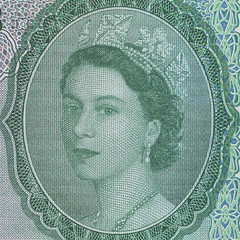 Mayfair-based Auctioneers Noonans, who specialise in coins, medals, banknotes and jewellery will be holding a 500-lot auction of Banknotes - all featuring portraits of H.M. The Queen on Tuesday, May 31, 2022 titled The Platinum Jubilee Banknote Auction.
Mayfair-based Auctioneers Noonans, who specialise in coins, medals, banknotes and jewellery will be holding a 500-lot auction of Banknotes - all featuring portraits of H.M. The Queen on Tuesday, May 31, 2022 titled The Platinum Jubilee Banknote Auction.
As expert-in-charge Thomasina Smith said: We are delighted to be holding this sale to coincide with the celebrations for The Queen's Platinum Jubilee. No other monarch has featured on such a wide range of notes from such a huge range of countries. Not only do they depict her through all 70 years of her reign, but stylistically they are wonderful works of art showing the progression and history of the banknote.
Ms. Smith carries on to say: The sale will feature banknotes from all corners of the Commonwealth and there will be examples from every country on which the portrait of The Queen has appeared. This includes New Zealand, Cyprus, Fiji, and the Falklands to name but a few, and to commemorate this historic sale, each banknote will be issued with a bespoke commemorative sale label.
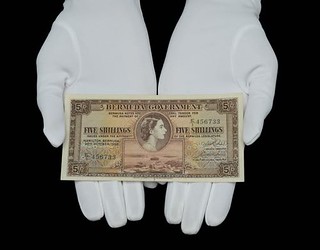 Highlights include a presentation £5 note, numbered no. A01 000013, dating from 1971 in a leather wallet. This was presented to Sir Jasper Quintus Hollom KBE (16 December 1917 – 29 August 2014) who was Chief Cashier of the Bank of England 1962-66 and subsequently the Deputy Governor of the Bank of England 1970-80, and is expected to fetch in the region of £5,000.
Highlights include a presentation £5 note, numbered no. A01 000013, dating from 1971 in a leather wallet. This was presented to Sir Jasper Quintus Hollom KBE (16 December 1917 – 29 August 2014) who was Chief Cashier of the Bank of England 1962-66 and subsequently the Deputy Governor of the Bank of England 1970-80, and is expected to fetch in the region of £5,000.
The first note with a portrait of the Queen was a five shilling issued in Bermuda, and is dated 20th October 1952, the year of her accession. The note is estimated at £500, while a ten shilling note from the Bank of Rhodesia and Nyasaland, now Zimbabwe and Botswana, dating from 27th May 1957 carries an estimate of £700.
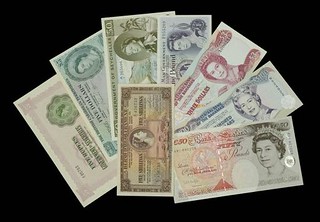 An important $100 note from Belize and dating from the 1980s is estimated at £1,800, and a specimen $5 note from Australia in the 1990s is expected to fetch at least £1,000, while a $5 note from the British Caribbean Territories, dated 1959, should easily exceed its £1,000 estimate.
An important $100 note from Belize and dating from the 1980s is estimated at £1,800, and a specimen $5 note from Australia in the 1990s is expected to fetch at least £1,000, while a $5 note from the British Caribbean Territories, dated 1959, should easily exceed its £1,000 estimate.
The auction catalogue will be a collectors piece in its own right, with full listings for each and every note, alongside complete discussions of every engraved portrait of The Queen that has ever appeared on a banknote. This includes details of the jewellery worn and the original photographs that inspired the engravers. Many of the portraits are very famous, and include the Annigoni portrait of 1972 and the Dorothy Wilding photographs of 1952.
For more information, see:
https://www.noonans.co.uk/
PLATINUM JUBILEE BANKNOTE AUCTION SELECTIONS
Here are some notes that caught my eye in the upcoming Noonan's Platinum Jubilee Banknote Auction. -Editor
Bank of England, John B. Page, £5, 11 November 1971, serial number A01 000013, with blue leather presentation wallet with gold image of Britannia on the cover, and BANK OF ENGLAND NOVEMBER 1971 on the interior, some surface damage to the leather wallet, the note uncirculated, a superb piece! EPM B332 £3,000-£4,000
To read the complete lot description, see:
https://www.noonans.co.uk/auctions/calendar/647/catalogue/422746/
Monetary Authority of Belize, $100, 1 June 1980, serial number X/1 106798, in PMG holder 66 EPQ, gem uncirculated, an exceptional note in this grade! TBB B205a, Pick 42a £1,800-£2,200
To read the complete lot description, see:
https://www.noonans.co.uk/auctions/calendar/647/catalogue/422755/
Isle of Man Government, R.H.Garvey, colour trial £5, ND (1956), serial number 000000, in PMG holder 64 NET, choice uncirculated, previously mounted, rare IOMPM M502ct, Pick 26cts £1,300-£1,500
To read the complete lot description, see:
https://www.noonans.co.uk/auctions/calendar/647/catalogue/424101/
Bank of England, Jasper Q. Hollom, specimen £10, 21 February 1964, serial number A00 000000, red SPECIMEN overprint, uncirculated and rare EPM B299s £1,200-£1,600
To read the complete lot description, see:
https://www.noonans.co.uk/auctions/calendar/647/catalogue/423225/
Bank of England, George M. Gill, specimen £5, 7 June 1990, serial number A00 000000, hollow red SPECIMEN overprint, specimen number 91, original about uncirculated and scarce EPM B357s £1,000-£1,500
To read the complete lot description, see:
https://www.noonans.co.uk/auctions/calendar/647/catalogue/420964/
Central Bank of Ceylon, 5 Rupees, 3 June 1952, serial number G/7 924355, in PMG holder 66 PPQ gem uncirculated and quite scarce in this grade TBB B305a, Pick 51 £1,000-£1,200
To read the complete lot description, see:
https://www.noonans.co.uk/auctions/calendar/647/catalogue/425535/
Bank of England, John B. Page, specimen £5, 11 November 1971, serial number A00 000000, two hollow red SPECIMEN overprints, minor handling and two pinholes, overall about uncirculated and scarce EPM B332s £800-£1,200
To read the complete lot description, see:
https://www.noonans.co.uk/auctions/calendar/647/catalogue/420967/
Bank of England, John B. Page, specimen £1, 9 February 1978, serial number A00 000000, two hollow red SPECIMEN overprints, specimen number 127, a few rust spots, overall a solid extremely fine, scarce EPM B337s £800-£1,000
To read the complete lot description, see:
https://www.noonans.co.uk/auctions/calendar/647/catalogue/420959/
For more information, see:
https://www.noonans.co.uk/
WAYNE'S NUMISMATIC DIARY: MAY 22, 2022
Tuesday May 17, 2022 brought another meeting of my Northern Virginia numismatic social group, Nummis Nova. Our hosts were Aaron Packard and Chris Neuzil, and we met at the Thai Luang restaurant in Herndon. While I finished a phone call in the parking lot, I saw regulars Roger Burdette and Steve Bishop walking in. Also present when I arrived at our table were Daryl Haynor, Tom Kays, Jon Radel, Mike Packard, Wayne Herndon and his guest Itay Tal, a banknote dealer and E-Sylum reader visiting from Israel. I took one of three empty chairs and soon Julian Leidman filled the one right next to me. Aaron was unable to attend.
Clockwise from left: Itay Tal, Mike Packard, Eric Schena (obscured), Tom Kays, Jon Radel, Chris Neuzil, Roger Burdette, Daryl Haynor, Wayne Herndon, Steve Bishop
Clockwise from top: Chris Neuzil, Roger Burdette, Daryl Haynor, Wayne Herndon, Itay Tal, Mike Packard
Books, Books, BooksAs E-Sylum Editor I'm often the first to know about new numismatic books, but soon I saw not one but THREE books for the first time. The first two were fresh from the Early American Coppers show in St. Louis, attended by both Mike Packard and Wayne Herndon. Stay tuned for more information on these. NOTE: the 2x2 Envelopes book isn't new, but it's the first time I saw a copy. Tom brought this one along.
- NBS Treasurer Chuck Heck's Die States of 1794 United States Large Cents
- The Ralph W. Rucker MD Large Cent Collection Part I
- Ralph Rucker's The Copper Collector's Guide to the Identification of 2x2 Envelopes
Ukrainian Banknotes, Stamp Money, and a Famous Stamp
A nice group of Ukrainian items were among the first numismatic pieces I saw being passed around the table. I completely overlooked the envelope that came along with them. I wasn't surprised that these were brought by
Eric Schena, and he later pointed out what I'd missed.
Eric writes:
"I brought a couple of things that are more current events related rather than some of my more usual exonumia. With the Russian invasion of Ukraine ongoing, I brought a couple of notes from the Ukrainian Peoples Republic prior to its incorporation into the Soviet Union. The 500 hryven note is dated 1918 and was printed in Germany and is especially colorful and quite beautiful.
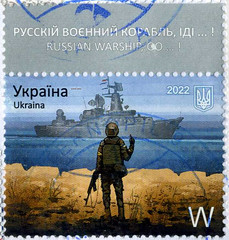 "The block of four 50 shagiv stamps are actually printed on stiff paper board and were used as small change for a short time. Both are neat items, but the block of four notes was mailed from Ukraine and was packed in something special. The envelope it came in has one of the
"The block of four 50 shagiv stamps are actually printed on stiff paper board and were used as small change for a short time. Both are neat items, but the block of four notes was mailed from Ukraine and was packed in something special. The envelope it came in has one of the Russian Warship, Go [self fornicate]!
stamps in a nice place of prominence, including a bit of the selvedge telling what the ship can do in Ukrainian and English.
"I have seen the unused stamps go for quite a bit of money and the first day covers are quite pricy now. I was very careful opening it and the cover is now proudly in my collection. There's apparently been a subsequent issue of that stamp but with a big DONE printed on it after the Moskva was sunk. I am not sure how many of these were postally used in a non-philatelic fashion, but I would imagine it's not a lot."
Discussion at my end of the table included shopping for Large Cents at the EAC show amid a confusing landscape of EAC grades and third-party grades, a world where every dealer can point to their favorite (and most favorable) list to claim their wares among the finest known.
Itay and I discussed the history of The E-Sylum and ad rates while a number of other interesting items were passed around the table.
News and Views from the Far End of the Table
[Tom Kays provided the commentary and images in this section. Thanks!]
Seated far down table from Wayne by the luck of the draw, Tom Kays captured the dinner crowd in mid pose as we anticipated digging into spicy Thai specialties. Aromas from Crispy Snapper, Pad Thai, and Curry dishes enticed us to hurry up reciting the Buddhist blessing If you knew what I know about the power of giving, you would not let a single meal pass without sharing it in some way.
Let us share with you some numismatic kabobs seen at this fabulous dinner.
Wayne Herndon's dinner guest was international currency dealer Itay Tal from Israel, who brought a 1945 Ten Pound Bearer Bond from Palestine, that would pay interest for twenty years as each coupon was clipped. Ten years of coupons were redeemed. Itay is seated third from the right, in front of Wayne Homren, your friendly E-Sylum editor.
Keeping with a Middle Eastern theme, Roger showed an uncirculated, Philadelphia Mint-made, Arabian American Oil Company (ARAMCO) one pound
gold disc, (but not minted for royalty payments to the Government of Saudi Arabia in exchange for oil, per Roger Burdette). These discs provided the equivalent of one British Sovereign's worth of gold. Many were later melted for bullion.
Tom brought his usual small case of unusual coins, arrayed in artifact fashion, each with a good story behind their presence in the case.
- Included from top, left were: 1760 Hibernian Half Penny of George II,
- 1640 Half Leeuwendaalder of Utrecht,
- 1807 Half Dollar from the United States,
- 1788 Massachusetts Copper (Ryder 8C),
Middle Row:
- 1688 Crown of James II,
- 1723 Brunswick – Luneburg – Celle (German State) Thaler of George I,
- 1739 Mexico Eight Reales of Philip V,
- 1821 Emergency 30 Sous of Palma de Mallorca,
Bottom Row:
- 1864 Silver Token of the Great (Sanitary) Fair in Philadelphia,
- 1909 Half Sovereign of Edward VII,
- 1876 Prussian 20 Marks of Kaiser Wilhelm (from WWII Army Air Corps Pilot Pack),
- 1915 Denmark 20 Marks of Christian X (from WWII Army Air Corps Pilot Pack),
- 1811 Two Reales of Santiago, Chile (Military Bust), and lastly,
-
1900 Half Sovereign of
Veiled
Victoria with its original Henry Chapman flip.
Question: Looking in The Copper Collector's Guide to the Identification of 2x2 Envelopes by Ralph Rucker with Del Bland, Henry Chapman's flips are illustrated with address No.1348 Pine Street, Philadelphia. Do any readers know when Henry Chapman's address was located at 333 S. 16th Street, Philadelphia, which helps date this 2x2 envelope and his acquisition of this half sovereign?
Of special interest is the 1821-dated, 30 Sous (Sueldos) Emergency silver coin of Spanish King Ferdinand VII, from the Bellver Castle, Palma de Mallorca, the capitol of the Kingdom of Majorca, a Spanish State located in the Balearic Islands on the Mediterranean Sea.
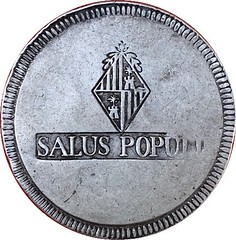 The reverse with coat of arms for Palma de Mallorca reads
The reverse with coat of arms for Palma de Mallorca reads Salus Populi
meaning Health to the People
in reference to a Yellow Fever epidemic that swept the island in the winter of 1821. The symptoms of Yellow Fever (spread by mosquitos) bears some resemblance to COVID-19 symptoms. These coins of civic necessity were made during the French occupation of the island. Coin blanks were made from melted silver taken from the island's churches and these coins were struck during 40 days in late November and December 1821.
The time has come and gone for sticky rice with mango ice cream, the check, and an end to all the storytelling for this evening at the Thai Luang in Herndon where they may say jur gan
meaning something like toodle loo.
Wrapping Up
I've never tried cataloging the clever restaurant restroom signage I've seen over the years, but these were among the cutest.
Clockwise from left: Chris Neuzil, Roger Burdette, Daryl Haynor, Wayne Herndon, Steve Bishop, Julian Leidman, Itay Tal, Mike Packard, Eric Schena and Tom Kays.
It was another enjoyable evening of numismatic fellowship. Luckily for me we wrapped up a little early and I wasn't so far from home, which left me time Tuesday evening to pack for my morning drive up to Pittsburgh for the Pennsylvania Association of Numismatists (PAN) show.
WAYNE'S NUMISMATIC DIARY: PAN SHOW MAY 2022
This Wednesday morning I hit the road about 8am, making one stop for (expensive) gas and another at the warehouse of Wizard Coin Supply, where owner Wayne Herndon had waiting for me a group of exhibit cases and other supplies PAN President Tom Uram had ordered. I'd volunteered to bring them up for the show, and I managed to cram them into my car along with my luggage and a box of archival material belonging to the Western Pennsylvania Numismatic Society.
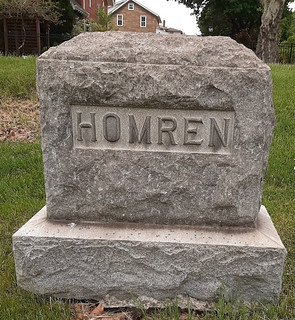 On arriving in Monroeville I went straight to the Convention Center loading dock where we unloaded the PAN materials. Then I grabbed a late lunch and checked into the Doubletree. The rest of the day was my mini-vacation time, and I spent it researching family history at a suburban Pittsburgh cemetery. After a false start - a misreading of a map put me in the wrong section - I discovered the family plot purchased in 1909 by my great-grandfather John Homren. He'd been born in Sweden in 1843 and passed away in 1925. He's interred here with his wife Henrietta, a son and two daughters. A fourth son, my grandfather Olaf, is in a city cemetery with my grandmother and father. Later on this visit I also photographed the homes where two sets of my great-grandparents had lived.
On arriving in Monroeville I went straight to the Convention Center loading dock where we unloaded the PAN materials. Then I grabbed a late lunch and checked into the Doubletree. The rest of the day was my mini-vacation time, and I spent it researching family history at a suburban Pittsburgh cemetery. After a false start - a misreading of a map put me in the wrong section - I discovered the family plot purchased in 1909 by my great-grandfather John Homren. He'd been born in Sweden in 1843 and passed away in 1925. He's interred here with his wife Henrietta, a son and two daughters. A fourth son, my grandfather Olaf, is in a city cemetery with my grandmother and father. Later on this visit I also photographed the homes where two sets of my great-grandparents had lived.
Arriving at the show Thursday I quickly ran into WPNS President Corleen Chesonis and club archivist Mike Drabick and made arrangements for returning materials to the club. The batch I had with me was not going to be scanned by the Newman Numismatic Portal. Five more boxes are in St. Louis now being digitized and will be shipped back to the club once complete.
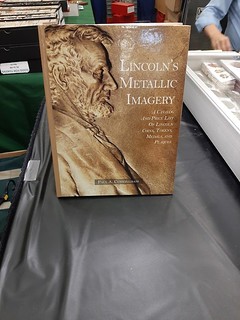 My next stops included the tables of David Kahn Rare Coins and Paul Cunningham. At DKRC I spoke with Melissa Kahn and took a photo of the books in one of their cases. At Paul's table I spoke with WPNS members Rich Crosby and Dick Gaetano and photographed Paul's book on Lincoln material.
My next stops included the tables of David Kahn Rare Coins and Paul Cunningham. At DKRC I spoke with Melissa Kahn and took a photo of the books in one of their cases. At Paul's table I spoke with WPNS members Rich Crosby and Dick Gaetano and photographed Paul's book on Lincoln material.
At the DKRC table a guard told me that taking photos wasn't permitted. I stopped, but later spoke with PAN officers Tom Uram and Pat McBride about getting a "press pass". They said they'd talk to the front desk staff. Photos are vital for show publicity and articles like these, but I get the security aspect: "Hey Vito, you wanna buy these coins? They're gonna fall off a truck later..."
Later I took these shots from the back of the hall. You need a panorama to capture the whole show in one shot! PAN gets bigger and better every year.
Hidden Gems of the Newman PortalAt 2pm Thursday I gave a presentation which was filmed by David Lisot. My subject was "Hidden Gems of the Newman Portal"
Here's one pro tip - click the link at the top of the viewer to go to the Internet Archive back end, where you can download the content in multiple file formats, including the Kindle book reader.
Old and New FriendsOn Friday morning I walked the bourse floor a bit and ran into Clifford Mishler. I thanked him for his help getting Krause Publications periodicals like Numismatic News and Coins digitized on the Newman Portal. On his trip to Pittsburgh he'd stopped to visit with my good friends Joel Orosz and Len Augsburger, the NNP Project Coordinator.
I also ran into my old WPNS friend and mentor Larry Korchnak. A couple items that caught my eye in his cases were a booklike display box of Napoleonic medals, and an uncut sheet of merchant scrip.
I thought I recognized his table neighbor so I introduced myself. It was none other than Matt Tavory of World Coins of South Florida, the young dealer who was recently profiled on National Public Radio. He wasn't sure what I was talking about when I said that must be his favorite shirt, but then he realized he'd been wearing it when photographed for the NPR piece. A true Buccaneers fan.
Here's a great shot of Larry and Matt, who bonded over their common love of siege coins. Matt had some nice pieces in his case for sale.
To read the earlier E-Sylum article, see:
COIN COLLECTING BUSINESS ON SOCIAL MEDIA
(https://www.coinbooks.org/v25/esylum_v25n19a14.html)
At 11am Friday I gave a short talk at the Civil War Showcase run by Rick Lank and Becky Rush. I spoke about discovering U.S. fractional currency via a note my grandfather had stored with a box of old coins, then learning about Civil War numismatics in the Foreword to Matt Rothert's little Whitman Black Book on Fractional Currency.
My only visual aid was a picture of the highlight of my encased postage collection, a Sands Ale 5 cents. Afterwards I spoke with some E-Sylum readers including Bill Brenner and Bill Bierly.
I had to head home Friday afternoon, so I missed a lot of the great programming at the showcase. But I had time to take photos of some of the exhibit cases.
Love that carte de viste!
I wish I could have stayed longer, but at least I did have time to talk briefly with several people, including Chick Ambrass, Ed Krivoniak, Pat McBride, Jerry Krupa, Byron Weston, Al Stricker, Al Boulanger, Pat Vetter, Simcha Kuritzky and others.
As I noted, the PAN show keeps getting bigger and better, attracting big crowds and dealers from across the country. Plan now for the Fall show October 20-22, 2022. Don't tell me you can't remember those dates!
For more information on PAN, see:
https://pancoins.org/
To read the earlier E-Sylum article, see:
PAN CIVIL WAR SHOWCASE UPDATE
(https://www.coinbooks.org/v25/esylum_v25n19a10.html)
14TH CENTURY PURSE WITH FIVE GOLD COINS FOUND
The purse was not found complete of course, but the metal clasp was discovered and nearby were a number of coins. Here's the press release from Noonan's. -Editor
Married couple, Phil and Joan Castle, who live in New Romney in Kent have been metal detecting together for over 30 years. It was in October 2018, while searching one of their favourite ploughed fields at nearby Romney Marsh that Joan using her XP gold max found a broken gold coin on the surface, another signal beside it in the soil revealed a Medieval brass purse bar at eight inches down. Phil came over to help and immediately found a gold coin. Over the next two hours four more gold coins were uncovered in an area of five metres, with Joan finding two herself.
The Purse and the coins, which are expected to fetch £12,000-15,000, will be offered for sale by specialist Coin, Medal, Banknote and Jewellery auctioneers Noonans (previously Dix Noonan Webb) on Tuesday, May 24, 2022 at their Mayfair saleroom (16 Bolton Street, London W1J 8BQ).
As Nigel Mills, Consultant (Artefacts and Antiquities) at Noonans explains: The coins were recorded by Jo Ahmet, the finds liaison officer for Kent as Gold nobles of Edward III issued between 1351-61. This was the first significant issue of gold coins that was successful after the previous attempts had failed and the coins were subsequently recalled and melted down. At the time, these were the highest denomination coins in circulation with a face value of 6 shillings and 8 pence, which is about £2,500 per coin in today's money. Measuring 3.4cm in diameter, they portray the King in a ship holding a sword and shield on the obverse with a royal cross on the reverse.
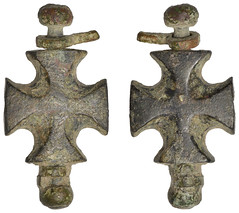 He continued:
He continued: Purse hoards are not common and when they do turn up but they usually contain just silver coins so this one is special. Apart from the broken coin which is a plated contemporary forgery, all five gold coins are in virtually mint state and must have been lost.
Phil who is 71 years old, used to work at Woolwich Arsenal and was introduced to the hobby of metal detecting by Joan (70) who searched for fossils and loved mudlarking on the River Thames.
Phil said: We had no idea what the coins were when we found them,
he goes on to say: At the time, I was having chemo for Leukaemia so detecting was a great relief.
The hoard has been disclaimed under the Treasure Act and Joan is hoping they can have a new kitchen with their share of the proceeds which will be split with the land owner.
For more information, see:
https://www.noonans.co.uk/
EIGHT REALES: THE FIRST INTERNATIONAL CURRENCY
This article on the long history and influence of the Spanish dollars was published by Hussein Larreal at coleccionistasdemonedas.com (in Spanish), and in English on the American Numismatic Association site. Here's an excerpt - see the complete article online for more. -Editor
More than a currency, the "Spanish dollars" were the basis of American national currencies: the multiple Latin "pesos" and the US "dollar" are successors of a Spanish currency whose respect transcended the great differences between societies of its time.
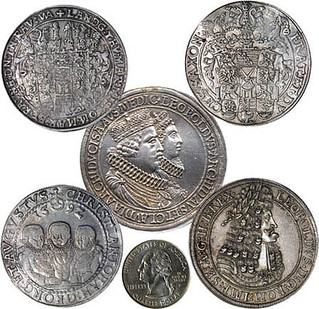 During the Modern Age, the Spanish Empire produced coins that ended up being used beyond its borders. They were the reals of eight: specimens that served for internal and international trade until after the Independence of the colonies. Below we will offer you some information about the origin, use and importance of these specimens, which symbolized Hispanic wealth, reach and influence on the five continents.
During the Modern Age, the Spanish Empire produced coins that ended up being used beyond its borders. They were the reals of eight: specimens that served for internal and international trade until after the Independence of the colonies. Below we will offer you some information about the origin, use and importance of these specimens, which symbolized Hispanic wealth, reach and influence on the five continents.
How the first reals of eight arose The reals of eight arise in a very particular way. On the one hand, in Austria, in 1486 Sigismund of Habsburg promoted the minting of large silver coins: the guldiner , weighing 31.93 grams and 937 thousandths of a law. These were not widely accepted at first, but served as inspiration for Bohemia to later produce the thaler , weighing 27 grams and 900 thousandths of a fine. These would be successful in Germanic lands, so Emperor Maximilian of Habsburg used them for propaganda purposes.
In parallel, the Catholic Monarchs were in charge of modernizing the Castilian monetary system through the Pragmatics of Medina del Campo (1497), a key moment in the history of Spanish coins, which detailed how to make silver reals and established the characteristics that would make them accepted . all over the world ; manufacturing its multiples was not yet contemplated.
Another important fact to consider is the founding of Mexico City and the construction of its mint. In 1537 he was authorized to mint different multiples of the real; For this reason, in 1538 they produced a few reals of eight that immediately ceased to be worked due to the difficulties involved in making them. Their existence was doubted for a long time , until three specimens were found in a shipwreck at the end of the 20th century .
As for Spanish pieces, the exact moment in which they began to be produced is unknown, but we can know that they appeared under the reasons defined by the Catholic Monarchs: Carlos I used the fame of the copies produced by his grandparents to mint them, with the intention that people accept them.
As they are undated, these numismas must be dated by studying the assayers' marks. María Ruiz Trapero, Professor of Epigraphy and Numismatics at the Complutense University of Madrid, pointed out that all the known European pieces are after 1543, but this does not exclude that they were minted earlier.
To read the complete article (in English or Spanish), see:
Coleccionistas de Monedas's Blog
(https://www.money.org/collector/user_74883/blog/the-8-reales-the-history-of-the-first-international-currency-that-gave-rise-to-almost-all-the-world-39-s-legal-tender-cu)
The Real of 8: the history of the first international currency that gave rise to (almost all) the world's legal tender currencies
(https://www.coleccionistasdemonedas.com/noticias/el-real-de-a-8-la-historia-de-la-primera-divisa-internacional-que-dio-lugar-a-casi-todas-las-monedas-de-curso-legal-del-mundo/)
THE 1941 VICHY FRENCH 5 FRANCS
This Stack's Bowers blog article by Numismatist for World and Ancient Coins Nicholas Fritz highlights a scarce survivor of WWII - a 1941 Vichy French 5 Francs piece. -Editor
Almost everyone knows the story of the Fall of France, the collapse of French defenses and subsequent occupation by Germany during the Second World War. What some people do not realize is that not all of France was occupied by the Germans. As the German army advanced in the summer of 1940, the French government fled Paris. The military situation was dire, and the French government chose to seek an armistice with the Germans. Prime Minister Paul Reynaud resigned and Marshal Philippe Petain, hero of Verdun in the Great War, replaced him. Petain sought an armistice with Germany, and the Third French Republic was formally dissolved on the 10th of July with Petain given dictatorial powers over the successor state.
The Germans occupied the northern portion of France as a military buffer against invasion from Britain, with the Southern part being administered from Vichy and retaining de jure independence. In reality, Vichy France collaborated quite closely with the Nazi occupiers, and both Petain and new head of government Pierre Laval were tried after the war as war criminals. ?
Vichy France continued minting coins during the occupation period, with some notable differences from the prewar period. Gone was the Republican motto of Liberté, égalité, fraternité that had symbolized the aspirations of France for so long. In its stead were the words Travail, famille, patrie; in English: work, family, and fatherland. The portrait of Marianne was replaced by the axe head; and compositions were changed to preserve scarce metals for the war effort.
Perhaps the most famous issue from this period is the 5 Francs of 1941 featuring a bust of Petain on the obverse. Produced out of pure nickel, the mintage was cut from a planned amount of 200,000,000 to 13,782,000 to save nickel. Stored in Castelarian for three years, these pieces were never circulated and were to be transported back to Germany for melting.
The boat transporting them across the Sambre River in Belgium was attacked by allied aircraft and was sunk. Allegedly only a few bags were saved. An example of this type is available in our June CCO Auction, graded MS-64 by NGC. A true survivor of the Second World War, and a piece with an important history.
To read the complete article, see:
The 1941 Vichy French 5 Francs
(https://www.stacksbowers.com/News/Pages/Blogs.aspx?ArticleID=1941-vichy-french-5-francs)
To read the complete lot description, see:
FRANCE. 5 Francs, 1941. NGC MS-64.
(https://auctions.stacksbowers.com/lots/view/3-WWMT5/france-5-francs-1941-ngc-ms-64)
COMMEMORATIVE MARKET RISE AND FALL, PART 2
Here's the second part of Dave Bowers' series on the rise and fall of the commemorative coin market. -Editor
As I discussed in my last article, in the late 1980s classic silver commemorative coins became a focus of the coin market, especially as people saw them as investment products, attracted by low mintages and generally high grades. Investors flooded the market and prices kept increasing, attracting more and more attention. However, prices went so high that by 1988 most serious numismatists had dropped out. Few wanted to pay, say, $3,000 for a coin that a few years earlier could have been bought for $500 or even less. As investment-oriented coin circles have always done, in 1990 the market ran out of new faces. Few new investors appeared. Those who had poured large sums of money into commemoratives, without knowing what they were buying, sensed that the market was quiet. Time to sell! And so, the prices dropped, dropped and dropped some more!
The result is that today early in the third decade of the twenty-first century nearly all silver commemoratives sell for small fractions of what they sold for in 1988 and 1989!
Here are some samples for Mint State-65 commemorative half dollars of 1990 (from a study I did that year) and values from the most recent (2022) edition of A Guidebook of United States Coins:
- 1892 Columbian: 1990: $3,850 • 2022 Guide Book: $275
- 1915-S Panama-Pacific: 1990: $4,500 • 2022 Guide Book: $1,325
- 1921 Pilgrim: 1990: $2,400 • 2022 Guide Book: $275
- 1925 Stone Mountain: 1990: $650 • 2022 Guide Book: $175
- 1927 Vermont: 1990: $2,400 • 2022 Guide Book: $460
- 1928 Hawaiian: 1990: $10,500 • 2022 Guide Book: $3.500
- 1935 Connecticut: 1990: $2,000 • 2022 Guide Book: $375
- 1936 Bridgeport: 1990: $1,200 • 2022 Guide Book: $180
- 1937 Roanoke Island: 1990: $700 • 2022 Guide Book: $230
- 1938 New Rochelle: 1990: $1,025 • 2022 Guide Book: $375
- 1946 Iowa: 1990: $400 • 2022 Guide Book: $110
But, no matter what the price history, to me classic commemoratives are endlessly fascinating, and these are among my favorite series from a numismatic viewpoint. I have written a great deal on the series, including Commemorative Coins of the United States, A Complete Encyclopedia, published by Bowers and Merena Galleries, that sold thousands of copies (despite the market declining at that time). If you are looking for an interesting new field to collect, consider classic commemorative silver coins from 1892 to 1954. Here are some suggestions:
1. Each commemorative has its own story, always interesting, sometimes surprising—the last with fake sold-out notices and the like, as distribution in the twentieth century was in private hands. If you had good contacts in Congress you could order commemorative coins, set the market price, and keep the profits. Two men who were later presidents of the ANA, Thomas G. Melish and L.W. Hoffecker did just that! To learn more, first check out what the Guide Book has to say, and then find a book or two or three on the subject and read them.
2. Cherrypick for quality. There are many certified MS-64 coins that are nicer than pieces that offer higher grades (and higher prices). Eye appeal is everything. You can see a lot by just looking, as Yogi Berra said, and so do just that!
3. Choose how YOU want to collect. Most people either acquire one each of the 48 different half dollar designs plus the 1893 Isabella quarter and 1900 Lafayette dollar or get one of each date, mintmark, or other half dollar variety—142 coins in all—plus the quarter and the dollar.
4. Once you start on your collection, take time to study each coin with a magnifier and enjoy its features.
Caveat: Although as I write these words the prices of these coins are at bargain levels, I see no indication that they will become hot tickets in the marketplace anytime soon.
To read the complete article, see:
The Rise and Fall of the Commemorative Market – Part 2
(https://www.stacksbowers.com/News/Pages/Blogs.aspx?ArticleID=rise-and-fall-of-commemoratives-part-2)
To read the earlier E-Sylum article, see:
COMMEMORATIVE MARKET RISE AND FALL, PART 1
(https://www.coinbooks.org/v25/esylum_v25n19a30.html)
LOUIS XIII GOLD MEDALLION
A unique gold medallion of Louis XIII is offered in the June 3-4 MDC Monaco auction. Here's a standalone article I excerpted from the press release. An amazing piece of work. See the earlier article for more information on the sale. -Editor
Lot 458.
Louis XIII (1610-1643). Gold medallion or artistic medal, Louis XIII and Marie de' Medici, assigned to Guillaume
Dupré, no date (1620-1622), Paris.
Obv. Bust of Louis XIII facing right, cuirassed, draped, wearing a plumed parade helmet and laureated [as Mars], on a kind of finial.
Rev. Bust of Marie de' Medici faceving right, cuirassed, draped, wearing a plumed parade helmet [as Pallas-Athena or Minerva].
Maz.- - Rouyer cf. XXVII/1 = BnF Paris L.2562 (bronze) = RN, 1892, p.491-496 = coll. P. Rattier (Rollin et Feuardent, 13th -14th april 1891, n° 71) = coll. B. Fillon (Rollin et Feuardent, 20th-24th march 1882, n° 165) - RN, 1990, p.232-253 [L. Smolderen - à propos de Guillaume Dupré] ; Gold - 86,10 g - 46,2 x 57 mm - 12 h.
Very high quality cast, with high reliefs re-chiseled by the artist himself and polished fields. The obverse and reverse listels have been processed differently. Unique and, more than a medal, a true piece of art. Almost Uncirculated. Price: 150000 €
This exceptional medallion (term we prefer compared to medal) is an unedited gold cast. This medallion is only known in bronze by the unique example of the Cabinet des médailles of the BnF in Paris, composed of two bronze plaques united in a brass frame with a bail. This bronze medallion of 47 x 58 mm, was acquired during the sale of Paul Rattier's cabinet (Rollin et Feuardent, 13th-14th of april 1891, n°165) and was previously a part of Benjamin Fillon's collection (Rollin et Feuardent, 20th-24th of march 1882, n°165). This bronze cast was represented in the Fillon's collection sale catalogue [Rollin et Feuardent, 20th-24th of march 1882, n°165], in the Revue numismatique of 1892, p. 491-492 (etching) and also in Les médailleurs… by Natalis Rondot, pl. XXVII n°1.
According to Henri de la Tour, in the Revue numismatique of 1892, p. 491 to 496, the Cabinet des médailles bronze cast,
Italian inspired
, was made by a French or Italian artist and would have been created between 1618 and 1623 : Careful
comparisons with coins and medals leads us to the same conclusion : the effigy on this piece was surely not made before
the one visible on the 1618's pattern and, on the other hand, was not made after 1623, the king being beardless whereas,
starting from 1623, the moustache starts appearing on the king's portrait, clearly distinguishable on the good strikes of
Dupré's medal with Justice in reverse. We will point out that the physiognomy of Mari de' Medici does not fit with the
king's one, the queen being rejuvenated and idealized, not showing the puffy figure visible on the contemporary
portraits.
Our example, like the bronze cast of the Cabinet des médailles, can be linked to another medal dated 1603, with no signature and still not found, only known by an intaglio made by the famous engraver Sébastien Leclerc (1637-1714), author of Médailles sur les principaux évènements du règne de Louis le Grand. This intaglio represents the bust of Marie de' Medici facing left, wearing a helmet and cuirassed, with the legend A MIS ICI REMEDDE MDCIII (anagram of MARIE DE MEDICIS 1603) [S. Leclerc, Monnaies et médailles…, pl. VIII n°2]. On the same page, board VIII n°3, is our oval medallion representing Marie de' Medici.
Whereas Marie de' Medici's portrait might be idealized considering the age of the Queen-mother, we think that the king's one is pretty accurate. The beardless face combined with his early middle age representation leads us to think, like Henri de la Tour in the Revue numismatique of 1892, that the engraving of the royal portrait has been realized in the 1620's and certainly before 1623.
There are very few events justifying the representation of a warrior king and a Marie de' Medici depicted as Pallas Athena (or Minerva), goddess of wisdom, intelligence and military strategy, but also symbol of Regency. Our medallion has to be posterior to the Treaty of Angoulême (30th april 1619) ending conflict between Louis XIII and his mother, consolidated on the 5th of september 1619 by the public reconciliation of Tours. On the 24th of December 1620, Protestants decide to take up arms after the La Rochelle's assembly. From 1620 to 1622, a military operation is carried out against Protestants of La Rochelle. Our medallion could symbolize the common policy adopted by the Queen-mother and her son to face the beginnings of the protestant revolt of La Rochelle ? Louis XIII, as the war chief, and Marie de' Medici, as Pallas-Athena or Minerva, goddess of wisdom and military strategy, could show the unity between the King and the Queen-mother facing the protestant threat and fighting it together.
The artist of our unsigned medallion is unknown. Some careful comparisons with Italian medals of the second half of
the XVIIth century made by Henri de la Tour in the Revue numismatique of 1892, p.495, demonstrate a clear transalpine
influence. Rouyer quotes de la Tour in a comment about a medallion belonging to Jacob Richier and says Fillon
attributed it to a Frenchman, but was surprised that such an engraver could have stayed unknown. M. Henri de la Tour,
without saying anything about the nationality of the author, thinks that it is –absolutely Italian inspired-
. Some elements
allow us to name Guillaume Dupré as the author of the medallion : his travel in Italy in 1612, which has
singularly
confirmed the Italianate and decorative tendencies of his style
(Smolderen, Revue numismatique 1990, p. 231), his
close relations with Rubens, author of some paneling from the Cycle of Marie de' Medici (1622-1625) in which the
portrait of Marie de' Medici as a triumphant queen links the two artists. But it's mostly the engraving quality, the finish
of the casting of which he was a renowned specialist and the high reliefs that lead us to Guillaume Dupré as the author.
Note that Guillaume Dupré was a Huguenot and, as Smolderen writes : It is allowed to ask ourselves if the Huguenot
Guillaume Dupré could have agree to celebrate such actions against other Protestants.
However, that could explain
why our medallion is unsigned.
Guillaume (1576-1643) is a sculptor since 1597, trained by his father-in-law Barthélémy Prieur. He becomes first
King's sculptor in June 1611, general controller of French coins' hallmarks and effigies in October 1601 jointly with
Jean Pillon, then alone in 1617. He is also general commissioner of artillery around 1629. His work is essentially
composed of portraits ; some of his medals are uniface. He is a fantastic portraitist with a taste for opulent reliefs. Despite
the event it seems to be connected with, our medallion is more than a medal, it is a piece of art worthy of the greatest
artists of his time. Let's quote Rouyer one more time : [this piece] is beautiful, made with finesse by a self-assured
hand ; it is more of a jewel than a medal.
Consulted works :
RONDOT (N.).- Les médailleurs et les graveurs de monnaies, jetons et médailles en France.- Paris : E. Leroux, 1904.
LA TOUR (H. DE).- Médailles modernes récemment acquises par le Cabinet de France. VI/. Louis XIII et Marie de Médicis.- Revue numismatique.- 1892.- p. 491-496, fig.
JOMBERT (Ch.-Ant.).- Catalogue raisonné de l'œuvre de Sébastien Leclerc. Partie 1.- Paris : l'Auteur, 1774.
LECLERC (S.).- Monnaies et médailles relatives à l'histoire de France, de Charles VII à Louis XIII.- Miscellany of XI boards, XVIIth siècle.
SMOLDEREN (L.).- À propos de Guillaume Dupré.- Revue numismatique.- 1990.- p. 232-253, pl. ee
MAZEROLLE (F.).- Les médailleurs français, du XV siècle au milieu du XVII .- 3 volumes.- Paris : Imprimerie nationale, 1902-1904.
To read the earlier E-Sylum article, see:
MDC MONACO JUNE 2022 AUCTION
(https://www.coinbooks.org/v25/esylum_v25n20a17.html)
MORE ON THE ZELENSKY MEDAL
Dave Lange purchased one of the new Zelensky medals and has these comments. -Editor
Dave writes:
"I imagine most readers of The E-Sylum have seen the announcement of a medal honoring Ukrainian President Volodymyr Zelensky, profits from the sale of which will go to the relief of Ukranians who have been displaced or are still in that besieged country. Though I have no direct connection to that country or its people I was eager to do something to assist in their plight, The combination of charity and numismatics was more than I could resist, so I ordered the medal. I'm attaching my photos of both sides for the benefit of readers, since the illustration in the press release does not indicate its actual color.
"The 3-1/2" medal features an accurate, high relief portrait of Zelensky on one side and his mission statement on the other. It is a very dark shade of brown that is nearly black. My photos have actually been lightened a bit to show the medal more easily. It comes with the plastic display easel shown, as well as a black, velvet-like pouch that is not shown. There is also a small data card with a biography of Zelensky on one side and facts about the medal on the other side. The stated mintage is 199 pieces, and the designer is Jim Licaretz.
"When I removed the medal from its pouch I was surprised at how light it is. Though the composition is described as "bonded bronze," that seems to be some kind of plastic or composite material painted bronze. This is the only disappointing feature of the medal, though I suppose it was necessary to keep the cost within reason and have something left over for the Ukranians after expenses were paid."
To read the earlier E-Sylum article, see:
ZELENSKY MEDAL SALES TO HELP UKRAINIANS
(https://www.coinbooks.org/v25/esylum_v25n14a26.html)
KENTUCKY DERBY CENTENNIAL MEDAL
On May 12, 2022 Kentucky Colonel Dennis Tucker published a nice post-race article about a Marcel Jovine-designed medal for the 100th anniversary of the Kentucky Derby. -Editor
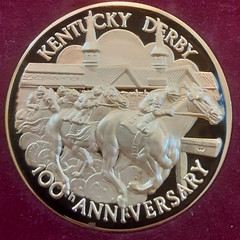 Last week's Kentucky Derby win by Rich Strike was one of the biggest upsets in the famous race's nearly 150-year history. The chestnut colt wasn't even scheduled to compete in this year's
Last week's Kentucky Derby win by Rich Strike was one of the biggest upsets in the famous race's nearly 150-year history. The chestnut colt wasn't even scheduled to compete in this year's Fastest Two Minutes in Sports
until just before the deadline, when Ethereal Road was scratched from the lineup.
If you're the betting type, a $50 wager on long-shot Rich Strike would have yielded a payoff of $4,090—more than enough winnings to build yourself a very nice display of Kentucky Derby medals and other collectibles.
One such medal is this week's featured collectible From the Colonel's Desk.
In 1974 the Wittnauer Mint of New Rochelle, New York (Makers of Fine Medallic Art
), produced a beautiful silver medal honoring Churchill Downs and the 100th anniversary of the Derby.
The medal was designed by artist Marcel Jovine, who was noted for his equestrian sculptures and later designed coins for the United States Mint. It's crafted of sterling silver with a gold overlay, and weighs 1.25 avoirdupois ounces.
To add this dramatic piece to your collection, you don't have to be a winning racer—just a winning auction bidder, or a lucky coin-shop visitor.
Recent sales put its value at around $50 for an average specimen, or more for attractively toned pieces.
There are thousands of beautiful and historic horse-racing medals, tokens, and related collectibles within American numismatics. Some of the best of them celebrate the Bluegrass State's long-beloved Kentucky Derby. Jump into the race and you'll find some winning pieces for your own collection.
Dennis adds:
"I think it's a delightful medal! And Marcel Jovine is a largely unsung numismatic superstar."
To read the complete article, see:
From the Colonel's Desk: Silver medals for the Kentucky Derby
(http://news.coinupdate.com/from-the-colonels-desk-silver-medals-for-the-kentucky-derby/)
DID SAN FRANCISCO BUY NORTON A NEW SUIT?
Bibliophiles and researchers are quite familiar with how conjecture, speculation and outright lies gradually morph into "facts" accepted by future generations. In a recent article, John Lumea of the Emperor Norton Trust examines how an often repeated claim about Norton's suit may have had its origins in a 1927 booklet. Here's an excerpt. -Editor
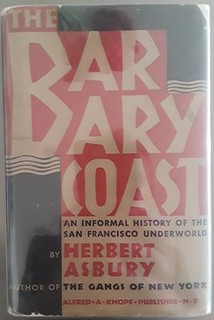 For nearly a century, those carrying forward Emperor Norton's story — not all, but enough to make it stick — have included amongst their readily accepted and blithely repeated
For nearly a century, those carrying forward Emperor Norton's story — not all, but enough to make it stick — have included amongst their readily accepted and blithely repeated greatest hits
the claim that, when the Emperor's uniform became tattered, the San Francisco Board of Supervisors, the City's elected government, bought him a new one.
If such a momentous thing had taken place, one would expect to see it contemporaneously documented in local newspapers of the day or in the official Municipal Reports of the City and County of San Francisco.
Over the last couple of decades, many online accounts of the Emperor — including the Wikipedia entry — have used the same sentence (or some very close version of it) to transmit this claim:
"When his uniform began to look shabby, the Board of Supervisors, with a great deal of ceremony, appropriated enough money to buy him another, for which the Emperor sent them a gracious note of thanks and a patent of nobility in perpetuity for each Supervisor."
Almost always, this sentence is quoted blind and without documentation of the claim itself. In fact, the sentence is plagiarized from the one-page passage on Emperor Norton that appears in Herbert Asbury's 1933 book, The Barbary Coast.
As in The Gangs of New York, Asbury provides a slender bibliography at the end
of The Barbary Coast, too. He prefaces the bibliography by saying that [a] great deal of the material in this book comes from old-time San Franciscans and has never before been published.
He goes on to say that the list that follows are those of the [s]everal hundred books and other published sources…consulted
that were especially helpful.
The list includes newspapers. It also includes Benjamin E. Lloyd's 1876 book Lights and Shades in San Francisco, which has a brief section about Emperor Norton.
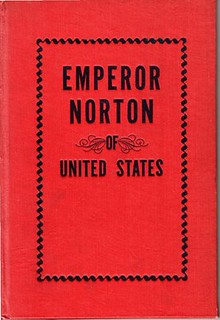 But, the only
But, the only resource
on the list that is explicitly about the Emperor is Albert Dressler's little booklet, Emperor Norton: Life and Experiences of a Notable Character in San Francisco, 1849–1880 — which Dressler self-published in 1927.
This may be where the story of a City-supplied uniform for the Emperor got its start.
Lloyd describes the Emperor's uniform — but says nothing about any new
uniform or who might have provided it.
To read the complete article, see:
Did San Francisco City Government Really Buy Emperor Norton a New Suit?
(http://emperornortontrust.org/blog/2022/5/18/did-san-francisco-city-government-really-buy-emperor-norton-a-new-suit)
THE BOOK BAZARRE
THRIFT SHOP PALESTINE BANKNOTE FIND
Justin Perrault passed along this story about a thrift shop paper money find. Thanks. Great story. -Editor
A rare £100 ($122) bank note found in a charity shop has sold for £140,000 ($171,724).
Oxfam volunteer Paul Wyman was working in the Brentwood branch in Essex, England when he spotted an unusual bank note in a box of donated items.
The £100 Palestine pounds is one of less than ten known to exist and was issued to high ranking officials during the time of the British Mandate in Palestine in 1927.
Savvy Paul decided not to put it on the shelves and contacted an auctionhouse where experts valued it at £30,000 ($36,798).
But it sold for a staggering £140,000 when it went under the hammer at Spink auction house in London.
Paul said: "I realized that I was holding something in my hands that was incredibly rare.
In the end it sold for £140,000 to go towards Oxfam's charitable work.
To read the complete article, see:
Rare bank note found in a charity shop sells for more than $171,000
(https://www.msn.com/en-us/lifestyle/lifestyle-buzz/rare-bank-note-found-in-a-charity-shop-sells-for-more-than-171-000/ar-AAXnd8h)
THE ROYAL CANADIAN MINT'S "ULTIMATE" COIN
A.J. Behul submitted this article about the Royal Canadian Mint's new "Ultimate" coin. Thanks. -Editor
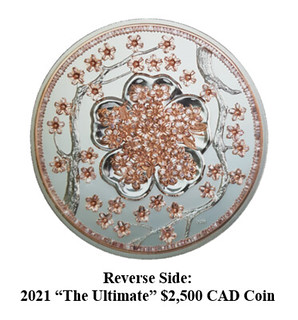
The Ultimate
Coin?
Written by A.J. Behul
As a matter of fact, yes...and its name says it all.
The Ultimate
is the Royal Canadian Mint's very first one-kilogram pure platinum coin, adorned with hundreds of rare pink diamonds from the renowned Argyle diamond mine, in the remote north of Western Australia.
The magnificent specimen was on display for two-days at Heffel Toronto, located on Hazelton Avenue.
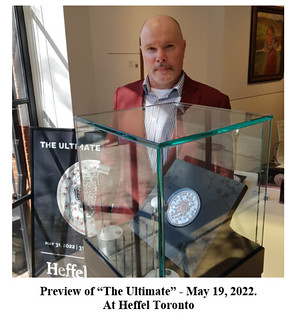 The one-of-a-kind masterpiece will be auctioned on May 31st, 2022, through Heffel, Canada's leading fine art auction house.
The one-of-a-kind masterpiece will be auctioned on May 31st, 2022, through Heffel, Canada's leading fine art auction house.
The coin truly has no equal, with a singular mintage of 1.
The reverse design displays a cherry blossom motif, featuring an unprecedented 462 pink diamonds graded as Fancy Vivid
and Fancy Intense
.
The obverse shows a portrait design of Her Majesty Queen Elizabeth II facing right, with a cherry blossom field pattern behind, and a face value of 2500 DOLLARS
.
The coin weighs 1kg and consists of 99.95% pure platinum. It has a diameter of 101.6mm, and a thickness of 6.5mm, and comes in a Proof
finish.
Estimate: $700,000 to $900,000 CAD.
Here's more information from the Royal Canadian Mint's website. -Editor
The Royal Canadian Mint's reputation for crafting coins of exceptional sophistication and artistry is known to collectors around the world,
says Marie Lemay, President and CEO of the Royal Canadian Mint. Celebrating the talent and imagination of our people through precious metal and fine art is our passion, as well as our trademark. We are proud that our new Opulence Collection takes our tradition of excellence to a whole new level.
To create such a distinguished coin collection, we collaborated with a variety of established industry leaders. Crossworks Manufacturing—an Argyle Pink Diamonds Authorized Partner—provided us with the pink diamonds that are featured on this year's Opulence Collection coins.
Each coin in the collection is crafted with cherry blossom motifs—an homage to the natural beauty of pink diamonds. Through their intricate and thoughtful designs, artists Simon Ng and Derek Wicks truly brought the pink diamonds to life, turning the coins into immaculate works of art.
The standout piece of the Opulence Collection is The Ultimate, a world-exclusive masterpiece that exemplifies Canadian creativity and craftsmanship. It represents the best of the best—a masterfully engraved piece of art rendered on a canvas crafted from the purest platinum and adorned with hundreds of pink diamonds from the Argyle Diamond Mine (462, to be exact). The pinnacle of refined beauty and rarity, there is only one coin of this kind in existence, truly making it the most covetable piece in any connoisseur's collection.
Derek Wicks, a renowned Canadian wildlife artist, brought the beauty of the cherry blossom to life on the reverse of The Ultimate.
My intention was to create a work of art that could double as a luxurious piece of jewellery,
says Derek Wicks. There is a sense of unity between the stylized design elements and the natural ones, and balance is achieved through asymmetrical and symmetrical placement: the main cluster, which anchors the design, is very symmetrical, while the asymmetric blossoms along the branches have a surprisingly organic feel. These features, combined with the visual weight of negative space, give the art a ‘controlled chaos' feel while beautifully representing one of nature's most poetic expressions.
This one-of-a-kind coin will be auctioned through Heffel Fine Art Auction House on May 31, following previews in Ottawa, Montreal, and Toronto.
For more information, see:
Redefining rare with our new Opulence Collection: Introducing pink diamond coins
(https://www.mint.ca/store/article/article.jsp?itemId=4500009)
https://www.heffel.com/
https://www.mint.ca/store/template/home.jsp
ROYAL MINT LAUNCHES LUXURY JEWELLERY LINE
Apparently this is a real trend - across the Atlantic The Royal Mint has also branched out into making jewellery. Here's an excerpt from an Elle magazine article. See the links before for the original press release. -Editor
If The Royal Mint conjures up visions of army medals, gigantic old-fashioned machines, piles and piles of glittering coins and school trips to the Tower of London, think again – for the world's leading export mint and Britain's oldest brand has now ventured into the luxury lifestyle sector, and there's a lot to get excited about.
First of all, the arrival of award-winning jeweller Dominic Jones as Creative Director, is injecting some young, innovative design energy into the historic institution. Jones shot onto the fashion scene back in 2009, when he became the first jeweller to win the British Fashion Council's NEWGEN award and then the first jewellery designer to show on the London Fashion Week schedule. Ever since, he has been delighting aesthetes the world over with his stylish, directional designs that play beautifully with shape and form.
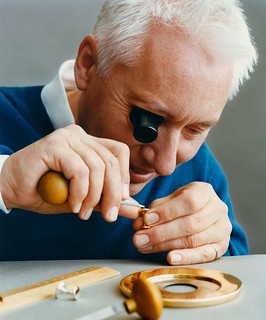 And now, with Jones at the helm, The Royal Mint has released its first-ever collection of fine jewellery under the new brand name 886, which takes inspiration from the year of the Mint's foundation.
And now, with Jones at the helm, The Royal Mint has released its first-ever collection of fine jewellery under the new brand name 886, which takes inspiration from the year of the Mint's foundation.
'The 886 collection began with the idea of an institutional gold bullion that has been distorted, inverted and warped into a gentle, soft shape that feels like it floats off the skin,' says Dominic Jones. 'I wanted to celebrate the inherent beauty of precious metal, without the distraction of stones or design flourishes. It's very brave in its simplicity.'
Think understated solid gold and silver earrings, chains, rings and cuffs, all of which are unisex and produced in South Wales using ancient coin and medal-making techniques – making them not only more durable and lustrous, but more valuable long-term too.
To read the complete article, see:
The Royal Mint Launches Its First Ever Luxury Jewellery Line With Dominic Jones
(https://www.elle.com/uk/fashion/what-to-wear/a40048024/886-the-royal-mint-dominic-jones/)
There's a nice video on the press release page. -Editor
For more information, see:
The Royal Mint launches 886, unveiling a debut unisex jewellery collection crafted in sustainable solid gold designed by Creative Director Dominic Jones and incorporating homeware
(https://www.royalmint.com/aboutus/press-centre/the-royal-mint-launches-886-unveiling-a-debut-unisex-jewellery-collection-crafted-in-sustainable-solid-gold-designed-by-creative-director-dominic-jones-and-incorporating-homeware)
https://886.royalmint.com/
LOOSE CHANGE: MAY 22, 2022
Here are some additional items in the media this week that may be of interest. -Editor
I enjoyed this short post on the Coin Talk chat board. -Editor
Domitian
Æ Semis, 2.90g
Rome mint, 90-91 AD
Obv: IMP DOMIT AVG GERM COS XV; Bust of Apollo, draped, r.; in front, branch
Rev: S C in exergue; Raven stg. r. on laurel branch
RIC 710 (C). BMC 453. BNC 484.
Acquired from Den of Antiquity, May 2022.
Domitian's smaller bronzes rarely feature a portrait of the emperor. This semis from 90-91 sports a bust of Apollo on the obverse and, appropriately enough, his divine messenger a raven on the reverse. Perhaps an allusion to Domitian's support of the arts.
To read the complete article, see:
A Coin Edgar Allan Poe Could Love
(https://www.cointalk.com/threads/a-coin-edgar-allan-poe-could-love.396696/)
A pub owner in Kent discovered a Cromwell shilling under the floorboards while doing some renovations. Nice find. -Editor
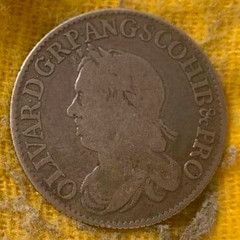 A pub owner is raising a glass to toast his good luck after finding a 364-year-old coin under his floorboards - as it was worth a staggering £12,500.
A pub owner is raising a glass to toast his good luck after finding a 364-year-old coin under his floorboards - as it was worth a staggering £12,500.
David Gorton was renovating the Grade II listed pub when he prised up the wooden beams and found what he thought was an old penny in the dirt below.
He'd sucked it up in a vacuum cleaner but got it out and then stuck it in his back pocket to look at later in the day, and when he did he realised it was an Oliver Cromwell silver shilling dating back to 1658.
David, who runs the Old Cottage in Margate, Kent, said: "There was a clunk noise and I thought I'd hoovered an old nut or bolt.
"But I emptied it later and saw it was a coin.
To read the complete article, see:
Pub owner finds 364-year-old coin with staggering value under his floorboards
(https://www.mirror.co.uk/news/weird-news/pub-owner-finds-364-year-26985244)
The Bookophile newsletter for May 18, 2022 has an article about an influential German mintmaster and the book he published. See the complete article online. -Editor
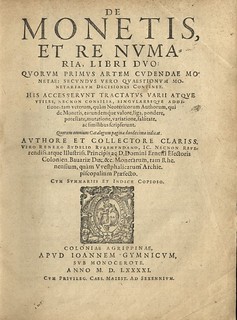 The Educated Mint Master: Reiner Budel
The Educated Mint Master: Reiner Budel
There are men who spend a lifetime gaining experience. And there are men who learn how to put their knowledge on paper at universities. And then there are a select few who possess both, experience and university knowledge. The mint master Reiner Budel was one of them. He wrote an influential work on numismatics.
To read the complete article, see:
The Educated Mint Master: Reiner Budel
(https://bookophile.com/the-educated-mint-master-reiner-budel/?lang=en)
Scott Semans passed along this article about nickel coinage. -Editor
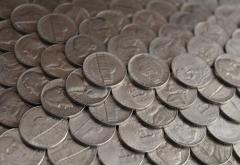 Nickel is an important metal for many industrial purposes, and its hardening and anticoercive properties explain why it is used in many US and EU coins. There are a few thousand different nickel alloys used in commercial production and a few hundred thousand aerospace, architecture, consumer, industrial, and transportation products that require nickel. Its use is highlighted in military, monetary, and battery applications.
Nickel is an important metal for many industrial purposes, and its hardening and anticoercive properties explain why it is used in many US and EU coins. There are a few thousand different nickel alloys used in commercial production and a few hundred thousand aerospace, architecture, consumer, industrial, and transportation products that require nickel. Its use is highlighted in military, monetary, and battery applications.
Despite nickel's economic importance and even the recent chaos in its wholesale market, there is almost no media coverage or economic commentary on the metal. Most economists do not know anything about nickel and generally ignore it.
However, like many commodities, nickel can serve as a microcosm for economic analysis and improve our historical understanding of inflation. Despite its origins as a fiat money, nickel has ironically become a marker for price stability in more recent decades.
To read the complete article, see:
Nickel: How Government Alchemists Turned a Base Money Hard and Now Are Expected to Kill It.
(https://mises.org/wire/nickel-how-government-alchemists-turned-base-money-hard-and-now-are-expected-kill-it)
Howard Berlin passed along this article about an antiquities bust in Israel. Thanks. -Editor
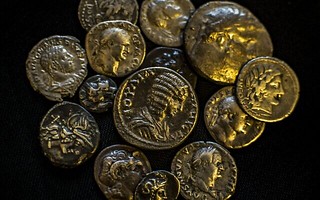 In one of the biggest busts in Israeli history, the Israel Antiquities Authority's theft prevention unit has recovered over 1,800 ancient artifacts from an unlicensed dealer in the central Israeli city of Modiin. Mostly coins and jewelry, the artifacts also included cuneiform tablets and bronze statuettes.
In one of the biggest busts in Israeli history, the Israel Antiquities Authority's theft prevention unit has recovered over 1,800 ancient artifacts from an unlicensed dealer in the central Israeli city of Modiin. Mostly coins and jewelry, the artifacts also included cuneiform tablets and bronze statuettes.
The items were seized on Sunday after a judge granted a wide-ranging search warrant of the dealer's private home.
IAA antiquities' trade supervision Ilan Haddad told The Times of Israel on Thursday that the IAA periodically checks all online antiquities auction platforms, including eBay, as well as new online storefronts out of Israel. The Modiin-based suspect, a man in his 50-60s, was identified through his online store, which was linked to an Israeli IP address.
To read the complete article, see:
Massive bust of illegal antiquities trade seizes 1,800 coins and ancient artifacts
(https://www.timesofisrael.com/massive-bust-of-illegal-antiquities-trade-seizes-1800-coins-and-ancient-artifacts/)
FEATURED WEB SITE: ROYAL NUMISMATIC SOCIETY
This week's Featured Web Site is the Royal Numismatic Society.
The Royal Numismatic Society is the UK's foremost society for numismatics – the study of coins, medals and related currency items. Founded in 1836 as The Numismatic Society of London, today's Society is international in subject and membership. Its lectures and publications deal with Classical, Asian, Medieval and Modern coins, paper money, tokens and medals. Fellows include scholars and enthusiasts from around the world.
The Society exists to support the study of numismatics and to promote scholarship on any subject related to numismatics. This includes running regular Meetings, which are open to all and include talks by senior figures in numismatic research as well as younger scholars.
The RNS produces a variety of publications on a range of numismatic subjects, including The Numismatic Chronicle, one of the most prestigious international venues for English-language publication on the subject.
In May 1904 the society obtained its Royal Charter. To celebrate the event, a dinner was given by the president J. Evans to the Council at the Holborn Restaurant in central London.

